As of 1 July 2025, Denmark has taken over the Presidency of the Council of the European Union, a role it will hold until 31 December 2025. Under the guiding slogan “A strong Europe in a changing world”, the Danish Presidency aims to strengthen the European Union’s resilience, competitiveness, and sustainability.
The Danish Presidency is focused on building a strong and responsible EU – one that delivers on internal and external security, drives forward the green and digital transitions, and ensures inclusive, cohesive, and forward-looking societies.
Some of the Presidency’s priorities, particularly relevant from EARLALL’s perspective, include the following:
Education, Training, and Youth
The Danish Presidency will lead the revision of the strategic framework for the European Education Area towards 2030, while also working towards a new declaration on European cooperation in vocational education and training (VET) to succeed the Osnabrück Declaration. This will aim to address skills shortages and enhance the attractiveness of VET. Additionally, the Presidency will promote mobility and cooperation through Erasmus+, particularly in the context of the post-2027 Multiannual Financial Framework (MFF), and will continue to support lifelong learning, the development of digital and green skills, and the creation of more inclusive education systems.
The EU Youth Dialogue will be a key focus, ensuring that young people have a meaningful voice in shaping future EU programmes and policies.
Social Europe and Labour Market Inclusion
To support a more competitive and fair Europe, the Danish Presidency is committed to fostering dynamic and inclusive labour markets that ensure decent working conditions and equip citizens with the skills needed for the future. Its priorities also include strengthening social cohesion, combating social exclusion, and promoting equal rights, gender equality, and real opportunities for all.
Green and Digital Industrial Transformation
The Presidency will pursue an ambitious industrial policy aimed at:
- Strengthening green innovation, investment, and technological leadership.
- Reducing regulatory burdens and improving clarity for businesses.
- Closing Europe’s innovation gap in key areas such as AI, quantum technologies, biotechnology, and space.
- Fostering stronger public-private cooperation in research and innovation.
Security, Civil Protection, and Fundamental Rights
The Presidency will focus on strengthening the EU’s internal security and resilience, ensuring that the Union is better prepared to address current and future crises, disasters, and security threats. It also aims to protect fundamental rights and enhance cooperation in civil matters.
We invite you to explore the full programme of the Danish Presidency of the Council of the European Union for more details.
As an associated member of the Lifelong Learning Platform (LLLP), EARLALL took part in the two-day General Assembly held in Brussels, which marked a key milestone in the development of the new LLLP Manifesto to be adopted in 2025. Building on its previous edition, the new Manifesto sets a clear vision for inclusive, resilient, and future-ready lifelong learning systems across Europe.
The first day was marked by a High-Level Policy Debate hosted at the European Parliament, dedicated to revising and shaping the future Manifesto. The debate gathered high-profile stakeholders and policymakers who welcomed the direction of the new document. Among them, Executive Vice President for Social Rights and Skills, Quality Jobs and Preparedness, Roxana Mînzatu, endorsed the Manifesto and recognised its alignment with the current European agenda — particularly the Union of Skills initiative. She underlined the importance of individual learning accounts (ILAs), micro-credentials, skills portability, and a European VET diploma — all strategic areas of interest for EARLALL.
Vice-President of the European Parliament and co-chair of the EP Intergroup on the Future of Education and Skills for a Competitive Europe, Victor Negrescu, together with representatives from UNESCO and the OECD, echoed the need for a people-centred, skills-oriented approach to learning. They welcomed the Manifesto as a timely response to today’s societal challenges, highlighting its relevance in promoting inclusive access, strengthening resilience, and improving the implementation of existing policies, particularly for disadvantaged groups.
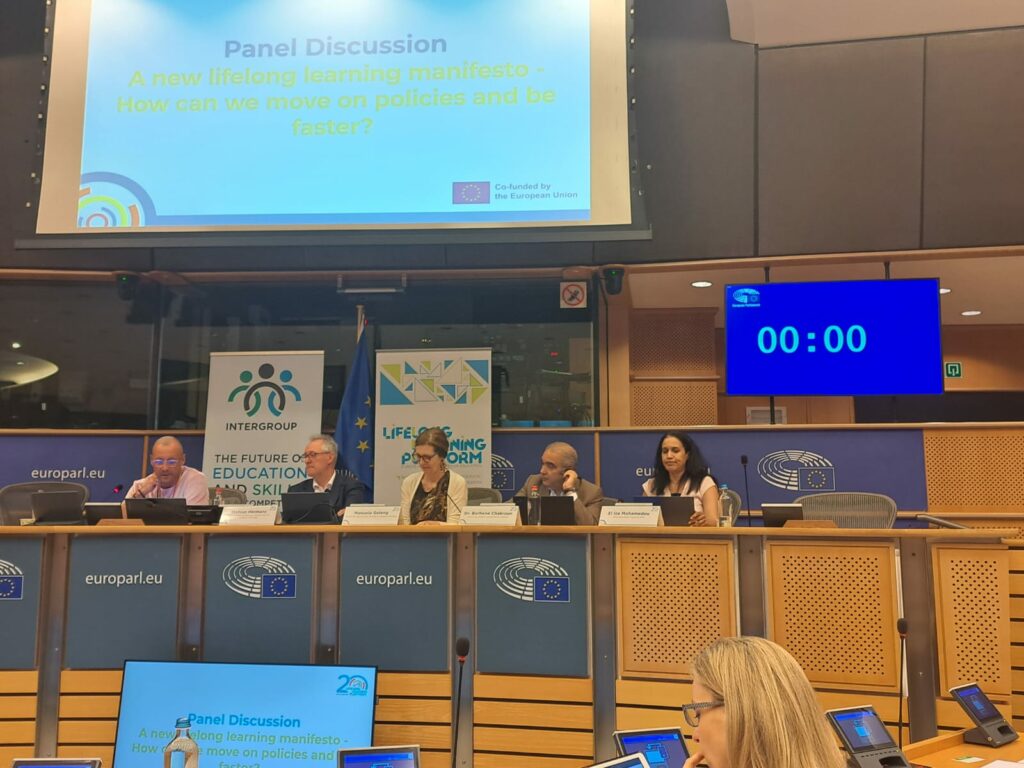
Dr Borhene Chakroun, Director for Lifelong Learning Policies, UNESCO, noted that the spirit of the Manifesto channels thought leaders like Paulo Freire and Jacques Delors, positioning it as not just an advocacy document, but a strategic agenda-setting tool. El Iza Mohamedou from the OECD Centre for Skills highlighted the need for improved use of existing data and the value of training systems that reach all learners. Stefaan Hermans, Director for Policy Strategy and Evaluation at DG EAC (European Commission), stressed the transformative role of the European Education Area, which has elevated cooperation and policy-making in education to new levels. He affirmed that education is a key indicator of a society’s adaptability and cohesion.
LLLP members, including EARLALL, actively contributed to the discussions throughout the debate, providing input and sharing practices from their respective territories.
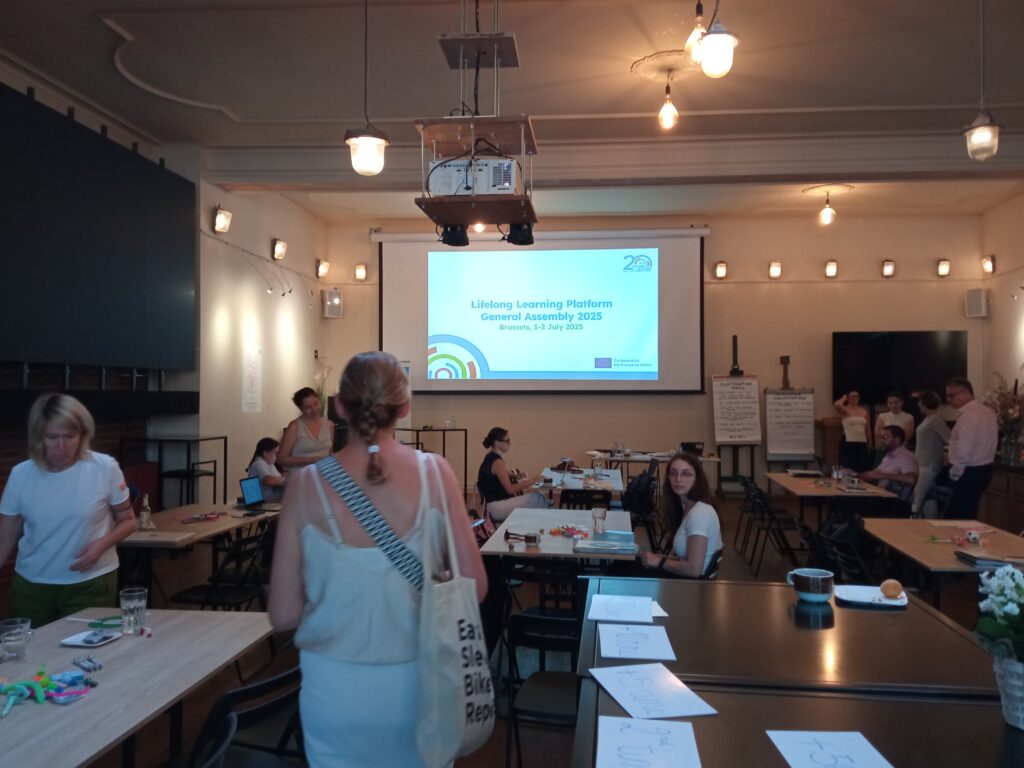
The second day of the General Assembly focused on statutory matters, including the adoption of the General Assembly’s 2024 reports, the 2025 financial plan, membership, discharge of the Steering Committee, and the work plan for 2025 presented by the LLLP Director, Brikena Xhomaqi.
EARLALL remains committed to supporting the Lifelong Learning Platform’s mission and contributing to the successful implementation of the new Manifesto in the coming years.
The European Alliance for Apprenticeships (EAfA) convened its annual High-Level Event in Brussels under the theme: “Apprenticeships for the Union of Skills and the Clean Industrial Deal.” The two-day gathering brought together high-level representatives from EU institutions, social partners, education providers, and regional actors, including EARLALL, a committed member of the EAfA. The event showcased the critical role of vocational education and training (VET) in delivering Europe’s green and digital transitions while boosting competitiveness and social fairness.
A Vision for Apprenticeships in the Union of Skills
Kicking off the event, Ms Roxana Mînzatu, Executive Vice President for Social Rights and Skills, Quality Jobs and Preparedness, outlined how apprenticeships are central to the Union of Skills (UoS) and the Clean Industrial Deal. She emphasised apprenticeships as enablers of quality jobs and competitiveness, particularly in sectors facing acute labour shortages due to decarbonisation and green innovation.
Key announcements included:
- The launch of a new Blue Book traineeship strand for VET graduates in 2026, opening 100 placements in EU institutions.
- The STEM Education Strategic Plan and Union of Skills framework aim to increase female engagement in STEM, including a goal to train 1 million women and girls by 2028.
- The upcoming VET Action Plan (2026) is to align with EU priorities in STEM and industry needs.
“Vocational education must become a star of the Union of Skills,” said Mînzatu, calling for apprenticeships to be recognised not only as a career path, but as a strategic tool for Europe’s future.
EAfA Expands and Evolves
Ms Manuela Geleng, Director for Jobs and Skills at DG Employment, highlighted the continued expansion of the Alliance:
- Over 500 members now participate, representing 3 million apprenticeship placements across 43 countries.
- New member signings took place during the event, reflecting growing momentum.
- An ambitious target of 700 members by 2030 was reiterated, along with stronger alignment with the Pact for Skills.
- Initiatives discussed include toolkits to expand apprenticeships for adults, sector-specific webinars, factsheets, and upcoming actions on basic skills development.
Voices from Social Partners: A Call for Quality and Cooperation
A panel featuring representatives from ETUC, BusinessEurope, SMEunited, and SGI Europe discussed how social partners can support the Union of Skills and the Clean Industrial Deal. Shared priorities included:
- Quality apprenticeships with fair pay and social protection, underpinned by workers’ rights and effective implementation.
- The need is for lifelong learning ecosystems and better integration of SMEs through simplified funding access.
- The importance of basic and transversal skills, with emphasis on inclusive, democratic training systems.
- Urgent investment needs, especially through the MFF, ESF+, and Erasmus+ programmes.
“We need to ensure apprenticeships are fair, clean, and democratic,” said Agnes Roman of ETUC, calling for stronger social dialogue and governance inclusion.
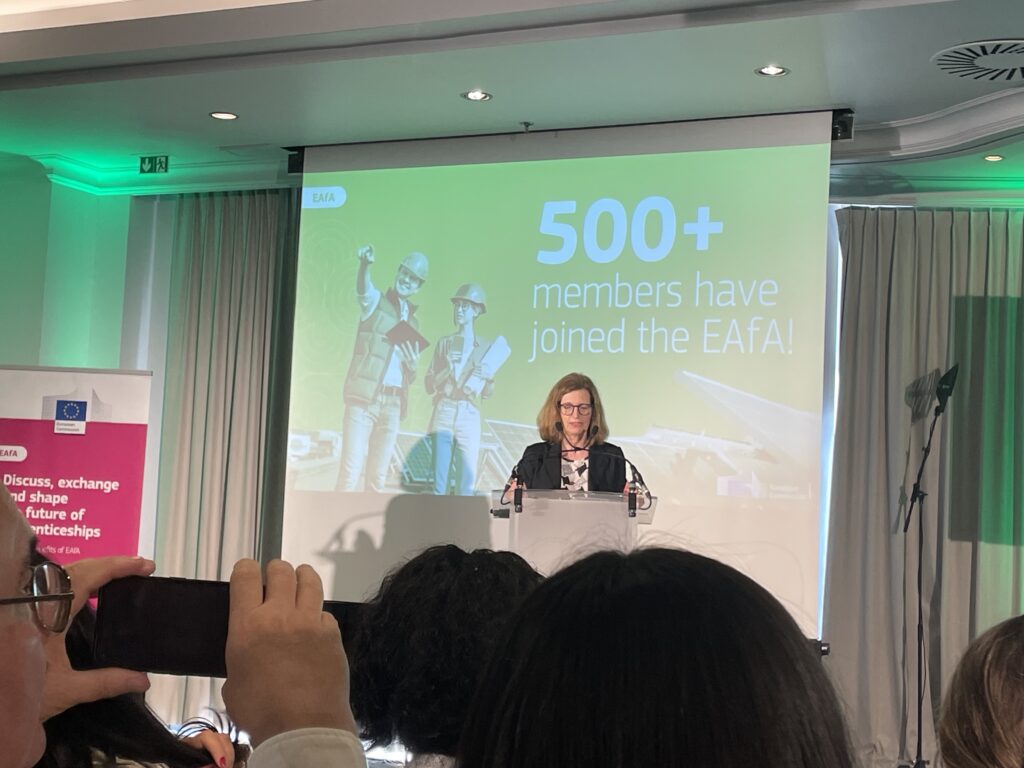
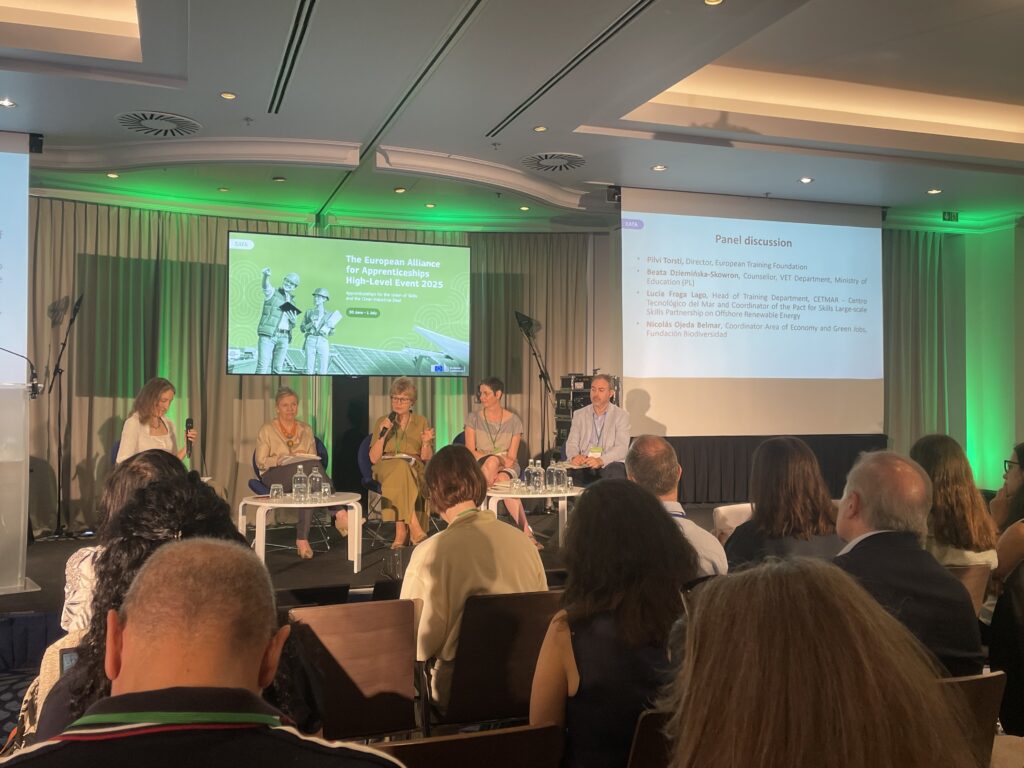
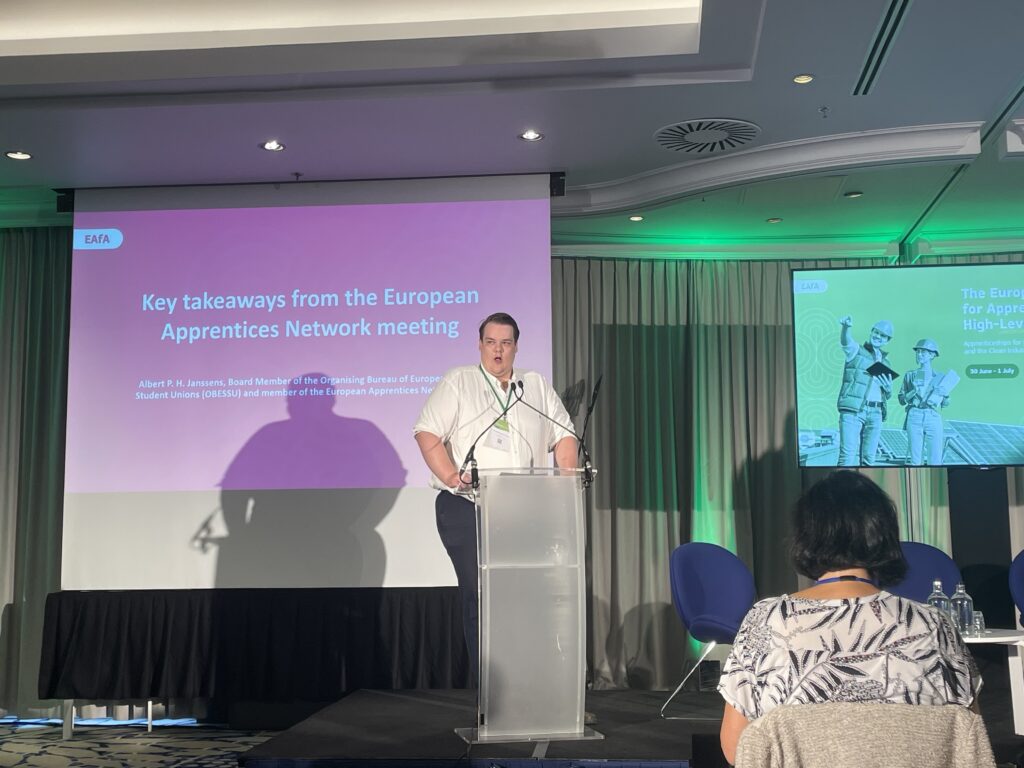
Skills for the Clean Industrial Deal: Examples from the Ground
The second day began with opening remarks by Mr. Albert P. H. Janssens, Board Member of OBESSU and member of the European Apprentices Network (EAN). He reminded participants that education is not only about responding to labour market needs but about empowering individuals to engage with what matters to them. He stressed the importance of supporting extracurricular pathways, embedding citizenship values in VET, and fostering a culture where associations are heard and genuinely represented. Linking green skills to Europe’s strategic global role, he underlined that while the U.S. and China may dominate in scale, Europe’s strength lies in its human capital—and cooperation, not competition, must be at the core of its values-based approach.
Following Albert’s remarks, practitioners shared on-the-ground strategies for developing skills aligned with the green transition. A dedicated panel explored how to enhance STEM education in apprenticeships, especially in energy-intensive and technology-driven sectors. Speakers from Cedefop, IBM, the European Builders Confederation, and others shared valuable insights.
In her concluding remarks, Ms. Anna Banczyk, Head of Unit for VET and Skills Portability, echoed the Executive Vice President’s full support for VET. She urged all stakeholders to walk the talk: “Let’s make apprenticeships a first choice, not a second or third. Let’s change the narrative and show the contribution of apprentices to building a greener, fairer future.”
With over 500 members and counting, the European Alliance for Apprenticeships is poised to play a central role in driving the Union of Skills and supporting the Clean Industrial Deal—with organisations like EARLALL actively contributing to that mission.
Get Together Event: EARLALL Takes the Stage
On the afternoon of 1 July 2025, the High-Level Event transitioned into the EAfA Get Together, a dynamic opportunity for participants to explore the work of the EAfA Communities and foster new partnerships. Led by EAfA members, this session offered a space for networking, collaboration, and knowledge exchange.
The EAfA Communities are designed to deepen engagement among members by encouraging bottom-up participation and interaction. They serve as platforms for sharing best practices, exchanging knowledge, and building strong, cross-border collaborations.
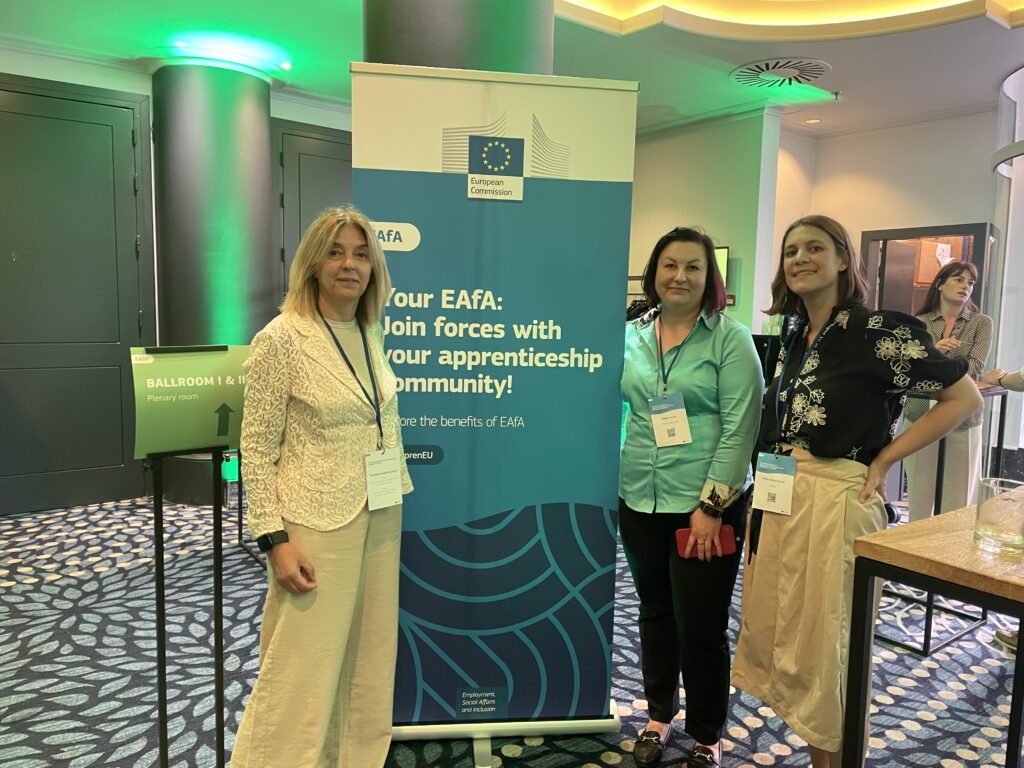
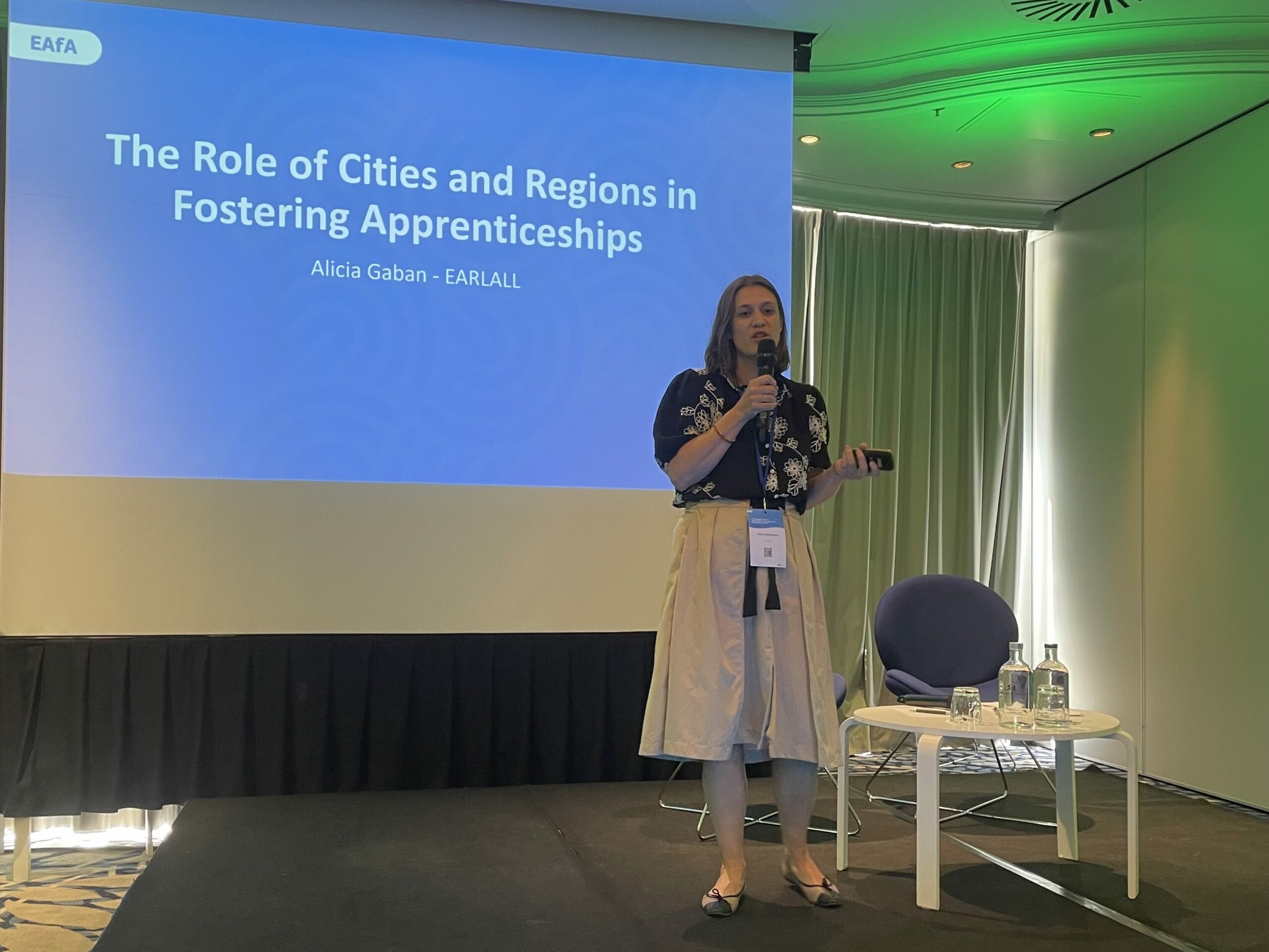
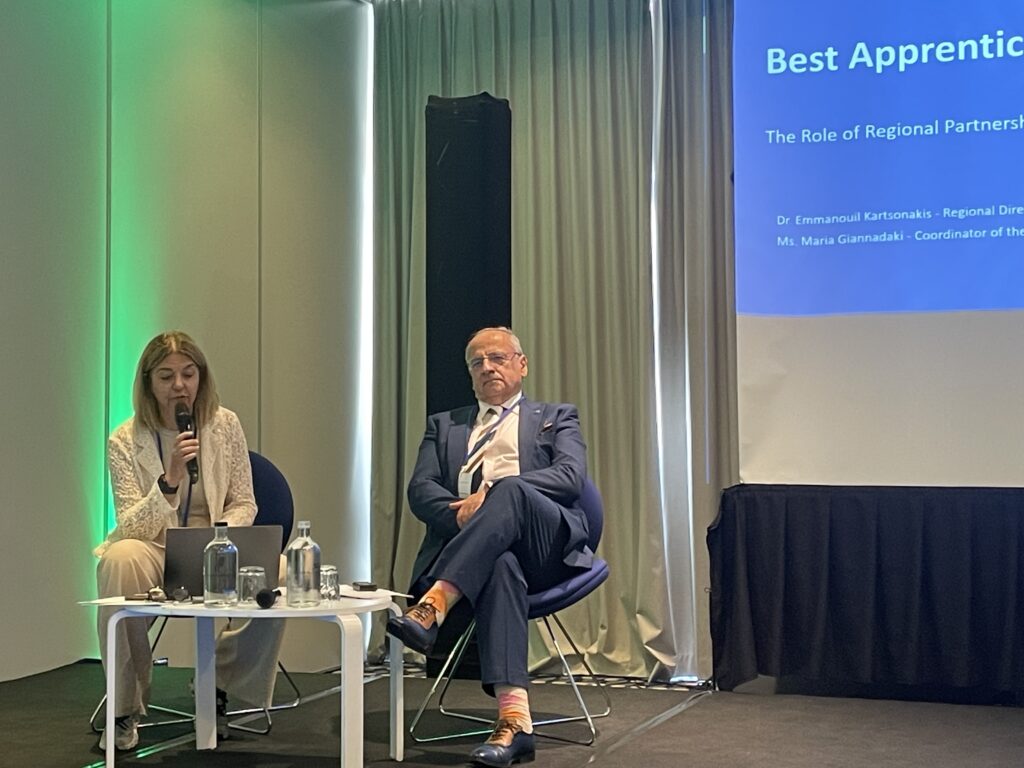
During the event, the chairs of all five EAfA Communities presented their main activities and achievements from the past year. This year also marked the launch of a new community on Higher Apprenticeships, joining the four existing ones:
- Learning Mobility of Apprentices
- Social Inclusion and Gender Equality
- Green and Digital Transitions
- The Role of Cities and Regions in Fostering Apprenticeships
The Community on Role of Cities and Regions in Fostering Apprenticeships is co-led by EARLALL, Fundación Bertelsmann, and the Metropolitan City of Rome. Representing this group, Alicia Gabán Barrio (EARLALL) took the stage to showcase the community’s ongoing work and future initiatives. She invited all participants to contribute to a survey aimed at collecting insights on how local and regional authorities can enhance both the quality and quantity of apprenticeships across the EU. (Take part here)
Alicia also highlighted the leading role of regions such as Tuscany, citing the QUEEN Quality apprenticeships for evolving labour needs, the Interreg Europe project, as an example of how regional authorities can promote quality apprenticeships.
Following the community presentations, participants joined parallel sessions focused on:
- Increasing female participation in STEM and the sustainable energy sector
- Integrating mobility in apprenticeships, with a spotlight on Denmark’s international apprenticeship model
- Inclusive practices in dual education systems
- Higher apprenticeships as a driver of innovation through partnerships
- The role of cities and regions, including a case study from Crete
The 2025 EAfA High-Level Event confirmed that regions are essential to building a strong Union of Skills. Through initiatives like the EAfA Communities and projects led by EARLALL members, regional and local authorities are turning European ambitions into reality—promoting quality apprenticeships, lifelong learning, and inclusive green and digital transitions.
As Europe moves toward the 2026 VET Action Plan, regional cooperation will be key to ensuring that apprenticeships remain a strategic tool for a fair, competitive, and sustainable future.
On June 30th, 2025, EARLALL had the pleasure of hosting a high-level delegation from the Brittany Region at the Basque Country Delegation in Brussels. The visit, welcomed by Marta Marín, Delegate of the Basque Country to the EU, provided a valuable opportunity to exchange on regional strategies for skills, lifelong learning, and the power of territorial cooperation.
The delegation was led by Forough Dadkhah, Vice-President of the Brittany Regional Council in charge of employment, training, and guidance, and included several regional councillors and senior representatives from the Brittany administration and the Brittany Europe Permanent Delegation. The visit exemplified Brittany’s commitment to fostering cooperation with other regions and engaging in European-level dialogue on skills and education.
Together with Noelia Cantero, Director of EARLALL, and Marta Marín, the group explored the common challenges and innovative responses regions are deploying to build resilient and inclusive skills systems. Two compelling examples stood out during the discussions: the experience of Tknika in the Basque Country, a centre of innovation in vocational education and training (VET), and the network of “Third Places” such as La Canopée in Brittany, which blend training, innovation, and community engagement in a decentralised and flexible format.
These concrete initiatives demonstrate how regions are not just policy implementers, but key innovators in the field of lifelong learning. They are uniquely positioned to design and deliver training pathways that are tailored to local realities while contributing to broader European goals such as the green and digital transitions.
The visit also sparked reflection on how regional cooperation can be further strengthened, and how EARLALL—as a network of like-minded regional authorities—can drive policy influence and shape European initiatives to better support territorial needs. The shared understanding was clear:
“There can be no Union of Skills without the regions.“
We thank our colleagues from Brittany for this enriching visit and Marta Marín for her warm welcome and for sharing valuable examples from the Basque Country too. We look forward to continued collaboration in advancing regional cooperation and empowering citizens through education across Europe.
Delegation from the Brittany Region:
- Forough Dadkhah, Vice-President for Employment, Training, and Guidance
- Elisabeth Jouneaux-Pédrono, Regional Councillor for Health and Social Training
- Olivier Le Bras, Regional Councillor
- Gaël Le Meur, Regional Councillor for Maritime Sectors and Training
- Anne Patault, Regional Councillor for Equality
- Régine Roué, Regional Councillor
- Arnaud Toudic, Regional Councillor for Associative Life
- Eric Le Bour, Cabinet of the President
- Olivier Gaudin, Deputy Director General, Head of Transitions and Foresight, Education-Training-Economy Division
- Tangi de Rochefort, Project Manager for Partnership Dynamics
- Aude Körfer, Head of Brittany Europe Permanent Delegation
- Rozenn Maréchal, Policy Officer for Social Affairs, Transport, Research & Innovation
Hosts:
- Marta Marín, Delegate of the Basque Country to the EU
- Noelia Cantero, Director of EARLALL
From 20 to 22 May 2025, the European Training Foundation (ETF) hosted a peer-learning workshop in Turin, Italy, as part of the EU-funded DARYA project (Dialogue and Action for Resourceful Youth in Central Asia). The event brought together more than 30 representatives from Kazakhstan, Kyrgyzstan, Tajikistan, Turkmenistan, and Uzbekistan to explore and exchange on the concept of Centres of Vocational Excellence (CoVEs)—a transformative model helping to shape future-ready VET systems across the globe.
In this context, the region of Castilla y León (Spain) made a significant contribution by sharing its pioneering approach to excellence in vocational education and training. Representing the region, Agustín Francisco Sigüenza Molina, Director General of Vocational Training, took part in the discussions and peer-learning sessions with key stakeholders from Central Asia.
Castilla y León: A Regional Model of VET Innovation
Mr. Sigüenza Molina presented Castilla y León’s regional model of excellence, highlighting how the region has:
- Developed its own certification system for CoVEs,
- Implemented ISATCOVE, a self-assessment tool used to support continuous quality improvement,
- And fostered strong collaboration between VET providers, industry, and public authorities.
This structured and regionally driven approach resonated strongly with participants, offering concrete inspiration for how national systems can leverage regional know-how to build responsive, inclusive, and innovative VET ecosystems.
Regional Contributions to Global Learning
The participation of Castilla y León in DARYA reflects a broader recognition: regional authorities play a key role in advancing international cooperation on skills and lifelong learning. Through this collaboration with the ETF, Castilla y León continues to demonstrate how territorial-level expertise can contribute to global education reforms—particularly in contexts where youth employment, innovation, and sustainable development are top priorities.
- Read the ETF article: “The big family tree: Central Asia learns and grows together”
- More about Proyecto DARYA
In the heart of Europe, where borders meet and cultures intertwine, the up PAMINA vhs stands as a powerful example of what regional cooperation can achieve in adult learning. Celebrating its 25th anniversary with the event “Dialogue Forum – Continuing Education Without Borders”, this cross-border adult education center continues to lead the way in fostering Franco-German understanding and bilingual learning in the PAMINA region—which includes parts of Baden (DE), the Palatinate (DE), and Northern Alsace (FR).
A Unique Cross-Border Learning Institution
Based in Wissembourg, Alsace, and registered under French law, up PAMINA vhs was born from a grassroots vision initiated by the Südwestpfalz District Adult Education Center. What started as a pilot project in 1994/95—backed by the state of Rhineland-Palatinate—quickly evolved into a pioneering model for institutionalised cross-border education. By 1998, with support from EU Interreg II funding, a permanent office was established, and the center formally became an association under French local law—mirroring the legal structure of other French adult education institutions.
Strengthening Regional Ties Through Education
The core mission of up PAMINA vhs is to promote bilingual, cross-border continuing education, strengthen regional networks, and offer inclusive access to knowledge through a shared European perspective. Its biannual programme spans five main areas:
- Art and Creativity
- Food and Drink
- Languages and Regional Studies
- History and Society
- Nature and Health
Courses are delivered in German and French, by bilingual instructors, across various venues in both countries. This model allows the center to directly engage with citizens on both sides of the border and create a truly European learning experience.
Impact in Numbers
Since its founding, over 50,000 participants have taken part in the center’s activities—averaging around 100 events and 2,000 participants per year.
up PAMINA vhs has also been widely recognized for its contributions. It was awarded the Michel Bréal Prize in 2015 and became a certified member of the Baden-Württemberg Adult Education Association, underlining its role in both regional and national education landscapes.
Why It Matters
The work of up PAMINA vhs reflects EARLALL’s belief that regions are essential actors in shaping meaningful, accessible lifelong learning opportunities. As a cross-border institution, it embodies European cooperation at the grassroots level—where policy meets people, and learning bridges language and culture.
📖 Explore the up PAMINA vhs brochure
🎥 Watch the introduction video
🌐 Visit the official website
The Gender Equality Task Force for Lifelong Learning, an initiative promoted by EARLALL, European Forum for Vocational Education and Training (EfVET) and the European Association for the Education of Adults (EAEA), held an action-driven webinar this morning addressing a critical issue that resonates across Europe: the inclusion of unemployed women into the labour market through lifelong learning. With over 25 participants from adult learning (ALE) and vocational education and training (VET) institutions, the session provided a collaborative platform for exchanging innovative practices and discussing policy responses to support one of the most vulnerable demographics in the labour market.
The Focus: Empowerment Through Lifelong Learning
Under the theme “Inclusion of unemployed women into the labour market: The relevance of lifelong learning approaches,” the webinar emphasized that empowering women—particularly migrant and unemployed women—requires more than just upskilling. It calls for a systemic, inclusive, and gender-responsive approach across education, policy, and social support systems.
Valentina Chanina (EfVET) opened the event by welcoming participants and underlining the urgency of addressing barriers that hinder women from re-entering the workforce. Susana Nogueira (EfVET) followed with a compelling overview of the structural and social challenges faced by unemployed women, highlighting persistent gender gaps in access to training, employment, and leadership roles.
Spotlight on Good Practices and Projects Across Europe
Throughout the session, a diverse lineup of speakers showcased a range of impactful projects and approaches:
- Francesca Torlone (University of Florence) presented the SALAM – Sustainable AccessibIlity to the LAbour Market Interreg Europe project and FELIN network, illustrating how tailored pathways—not just training courses—can support migrant women from their first entrepreneurial step to their business’s first balance sheet. She emphasized the role of coordinated action by regional and local authorities—combining education, guidance, welfare, and economic policy—to create sustainable support systems.
- Ruben Abarca (EVTA) highlighted WIDCON, a project focused on boosting women’s participation in the digital economy, addressing the gender digital divide and promoting inclusion in tech-driven sectors.
- Viola Pinzi (EAEA) shared insights on how micro-credentials are empowering adult migrant learners, offering flexible, accessible pathways to validate skills and improve employability.
- Chara Stassinopoulou (P-Consulting) presented the GUIDE project, emphasizing the importance of gender-sensitive career guidance to ensure women receive the targeted support they need at all stages of their learning and employment journeys.
Looking Ahead: Advancing a Gender-Inclusive Lifelong Learning Ecosystem
Camilla Winter (Camilla Winter AB and EARLALL associate member) closed the session with a strong message of encouragement and unity. She acknowledged the wealth of strategies, recommendations, and organisations already active in this space, underlining their importance. Reflecting on the webinar, she noted that “a lot is already happening,” and expressed confidence that the Gender Equality Task Force can make a meaningful contribution to this shared effort. She encouraged all participants to join the initiative, highlighting the power of collective action: “Together, we are stronger.”
Quoting Ruben Abarca’s remarks, she echoed the sense of momentum: there is clear potential for synergies and collaboration across sectors and regions. This closing message served as a call for continued commitment and cooperation. The insights and initiatives shared during the webinar will directly inform and strengthen the ongoing work of the Gender Equality Task Force for Lifelong Learning—a joint initiative by EARLALL, EfVET, and EAEA—committed to promoting equal access and participation for all learners.
The Task Force will continue to foster exchanges, identify policy gaps, and champion good practices that place women at the heart of recovery, inclusion, and innovation in the labour market.
As Europe continues its transition toward a more digital, green, and resilient economy, the need for responsive and high-quality Vocational Education and Training (VET) systems is more pressing than ever. The second Policy Recommendation from the LCAMP: Learner Centric Advanced Manufacturing Platform for Centres of Vocational Excellence (CoVEs) project addresses this challenge by exploring the role of Learning Factories in strengthening VET and preparing learners for the future of work.
This policy brief was produced with the active involvement of EARLALL, as part of its leadership role in building the LCAMP Alliance—a collaborative network for organisations involved in Advanced Manufacturing and Vocational Education and Training (VET).
What Are Learning Factories and Why Do They Matter?
Learning Factories are educational environments that simulate real-life industrial settings, providing VET students with opportunities to develop and apply a combination of job-specific, transversal, and digital skills through active, hands-on learning. They play a vital role in bridging the gap between education and the rapidly evolving demands of the labour market.
The recommendations in this brief are built on three core assumptions:
- A skilled workforce is essential for employability, economic resilience, and innovation at all levels.
- Modern, technology-rich training environments are critical to help learners adapt to digitalised work contexts.
- Experiential, learner-centred pedagogies improve the quality and relevance of vocational training outcomes.
Key Content of the Policy Brief
Based on the research conducted under Work Package 6 of the LCAMP project, the brief includes:
- A definition of Learning Factories, including a focus on Collaborative Learning Factories that foster cross-border innovation
- The rationale for implementing Learning Factories in VET
- Five key findings drawn from LCAMP’s research
- Six actionable policy recommendations
- A summary of all recommendations for easy reference
- Background on the LCAMP initiative
- A list of references and further reading
These recommendations are particularly relevant to VET systems operating at EQF levels 3 to 6, and are designed to inform policies at the EU, national, regional, and local levels.
Discover More
To support awareness and knowledge-sharing, the policy brief is accompanied by a visual carousel that highlights the main findings and recommendations in an accessible, engaging format.
Download the full brief and learn more about LCAMP’s work here.

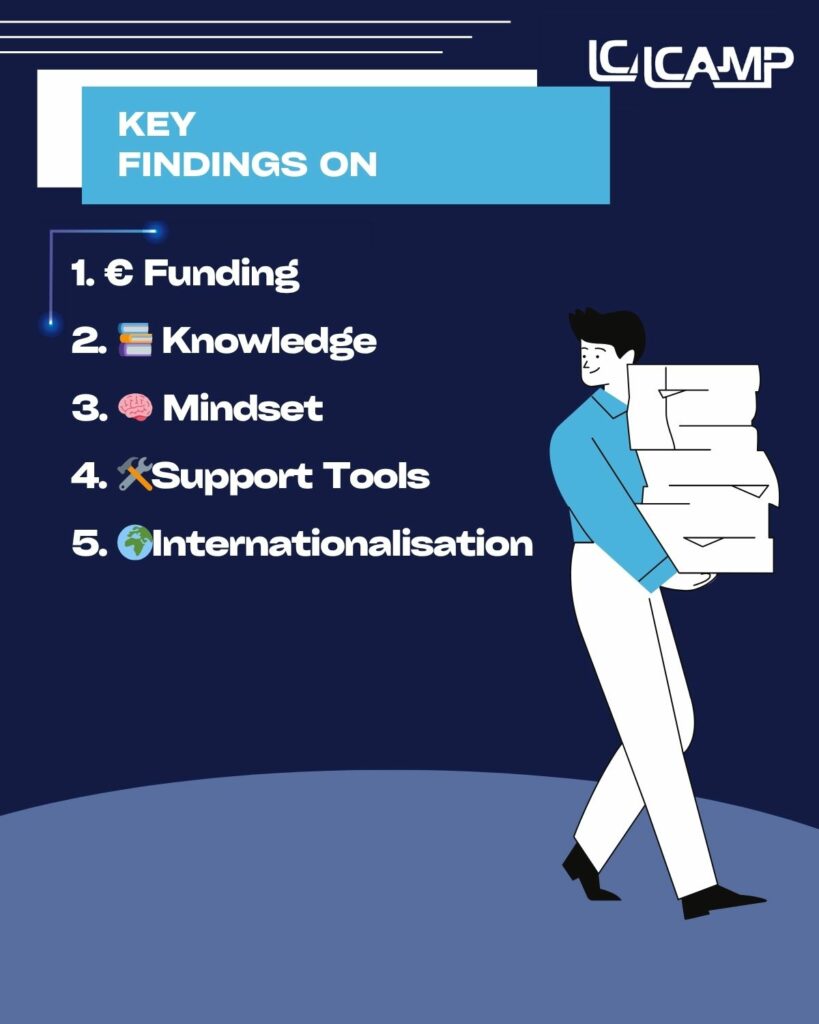
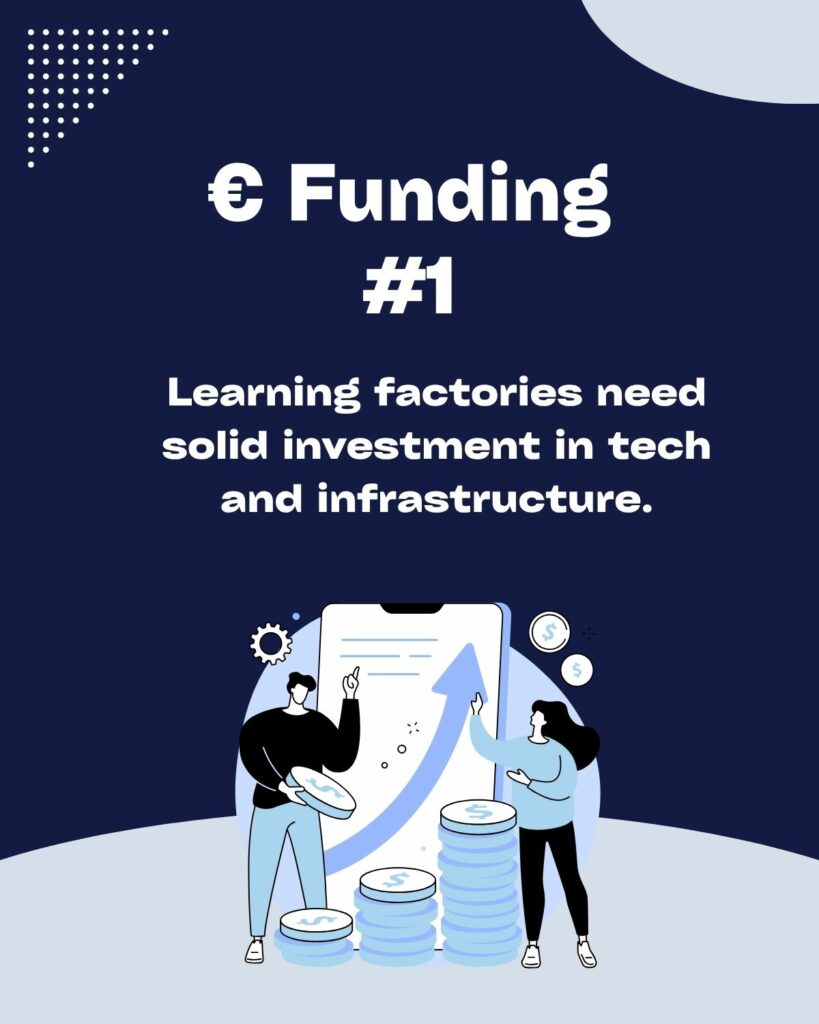

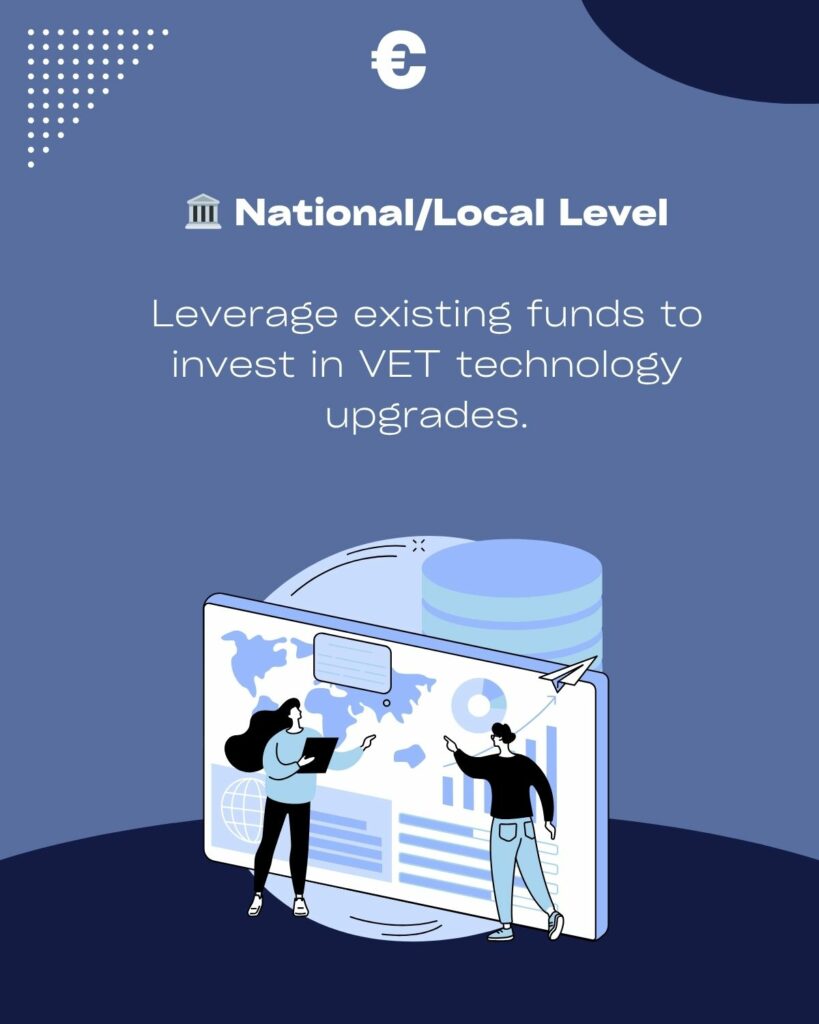

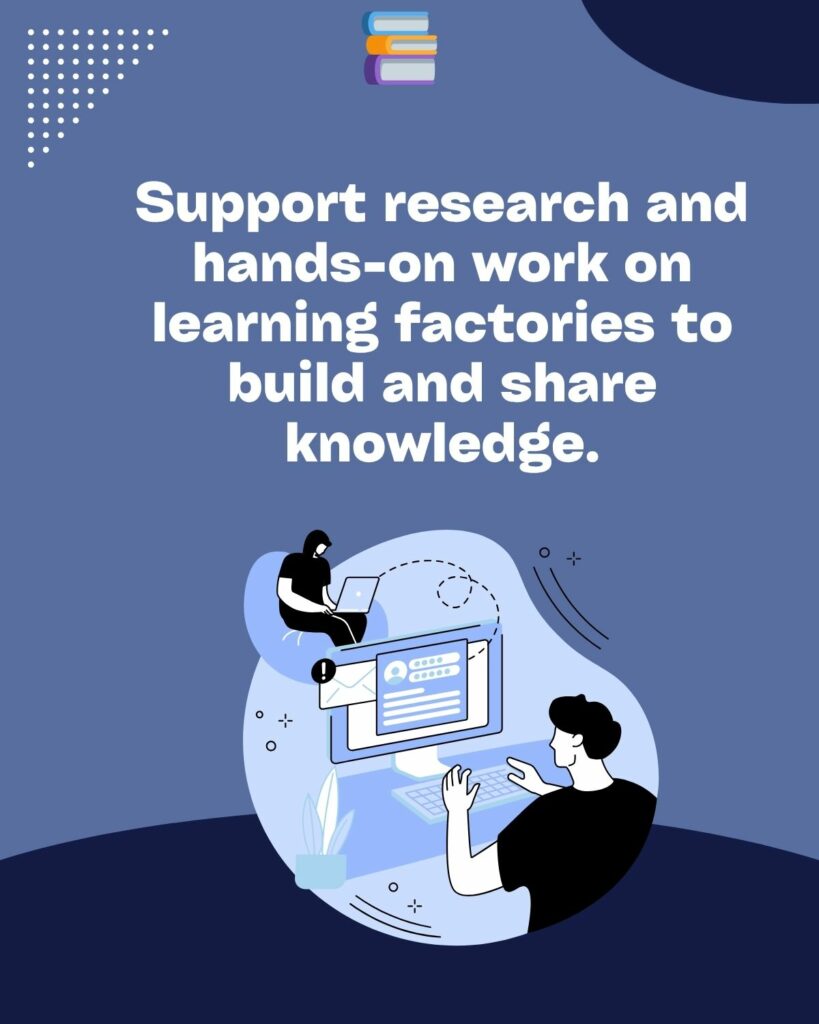

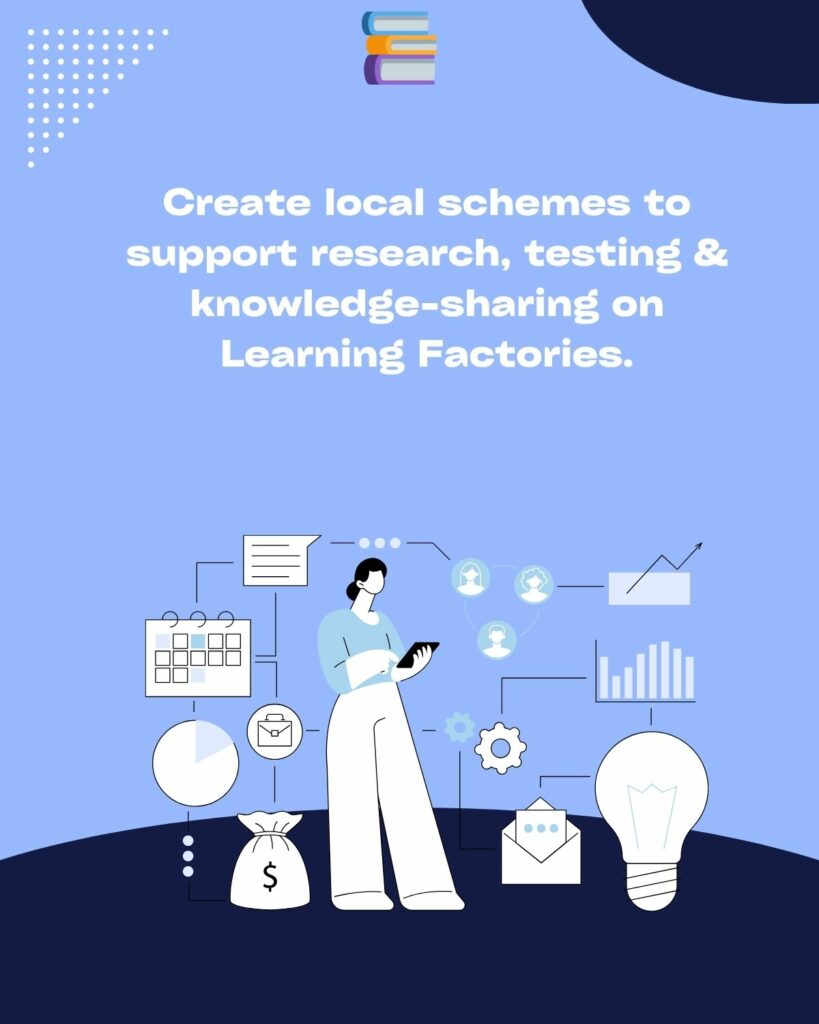

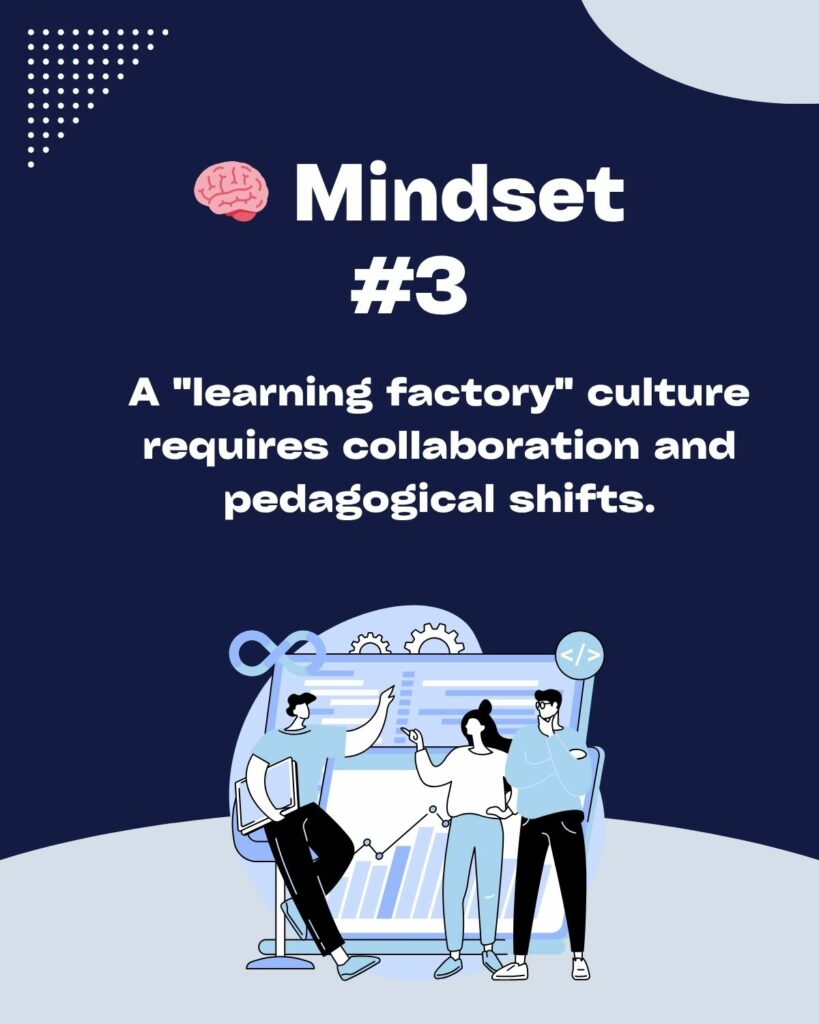
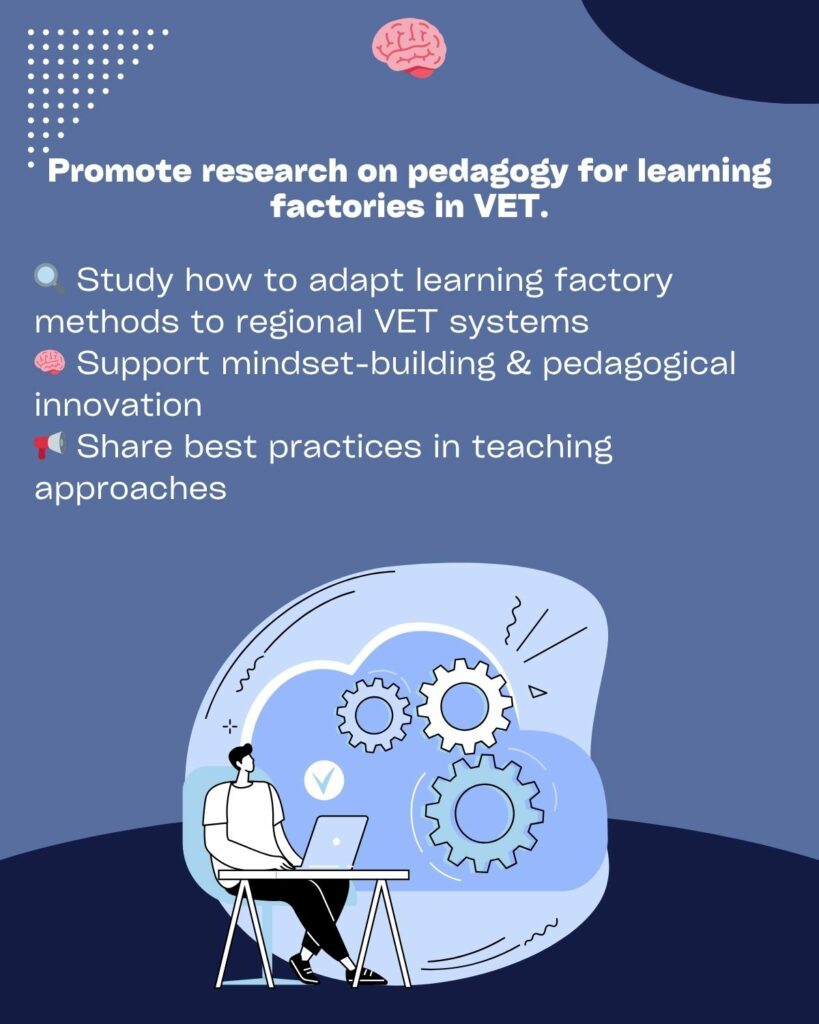
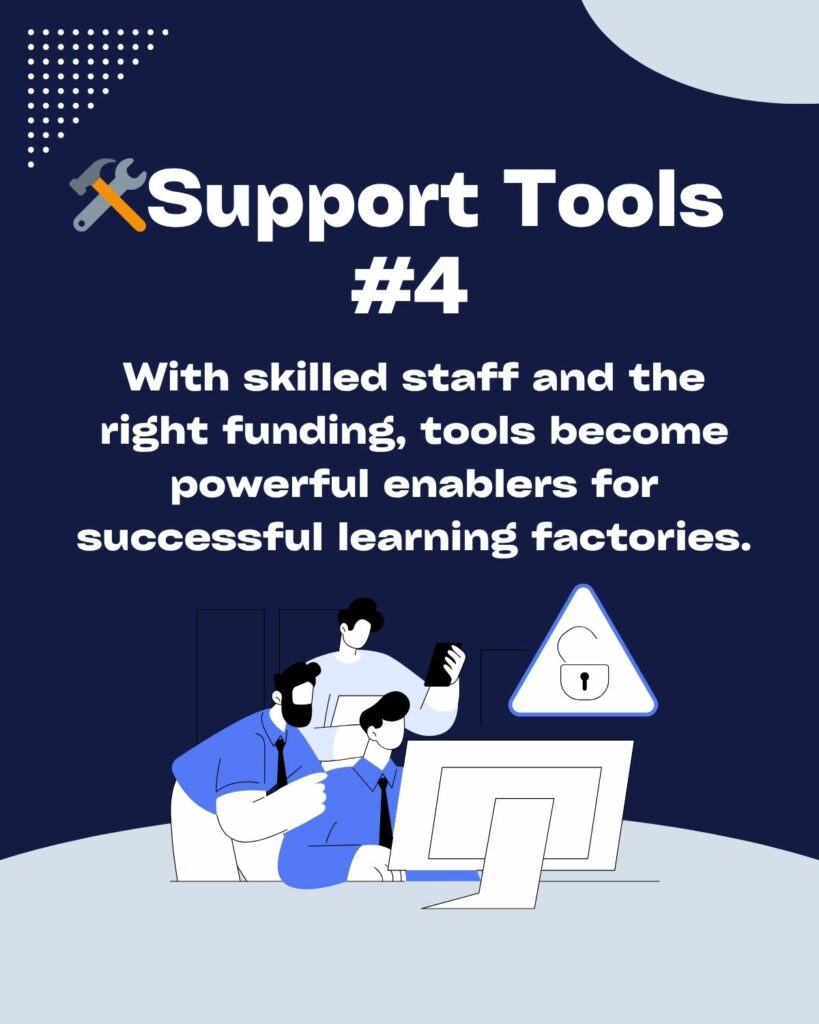
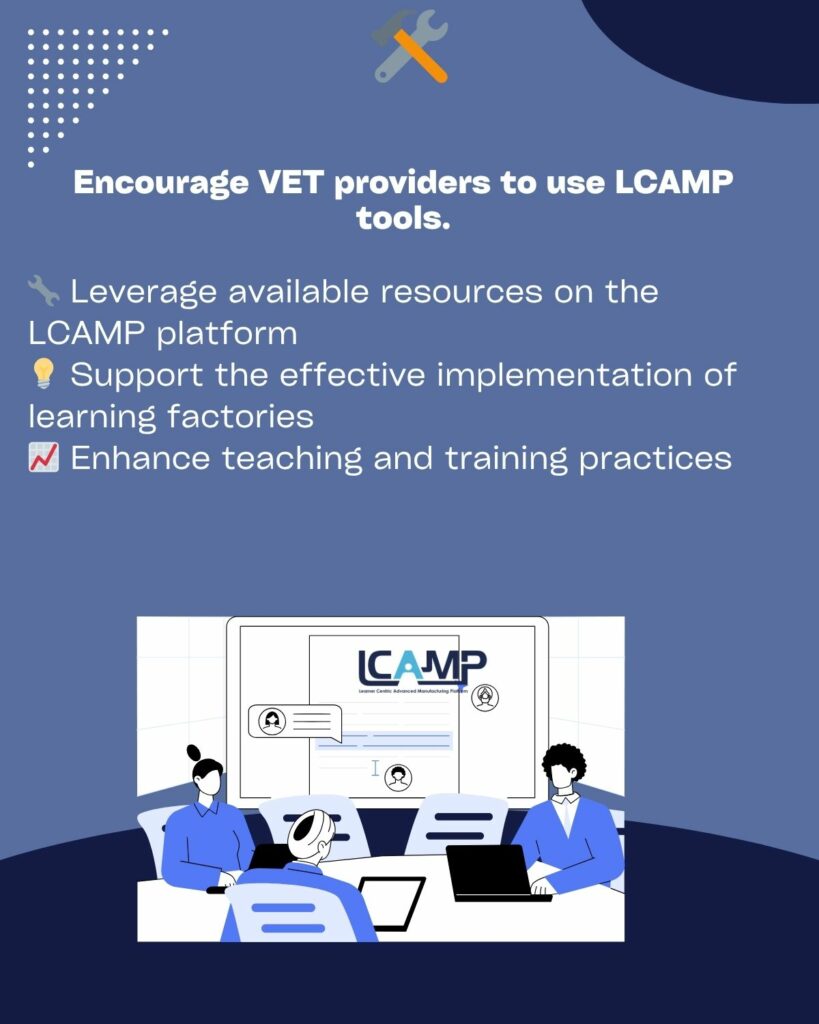
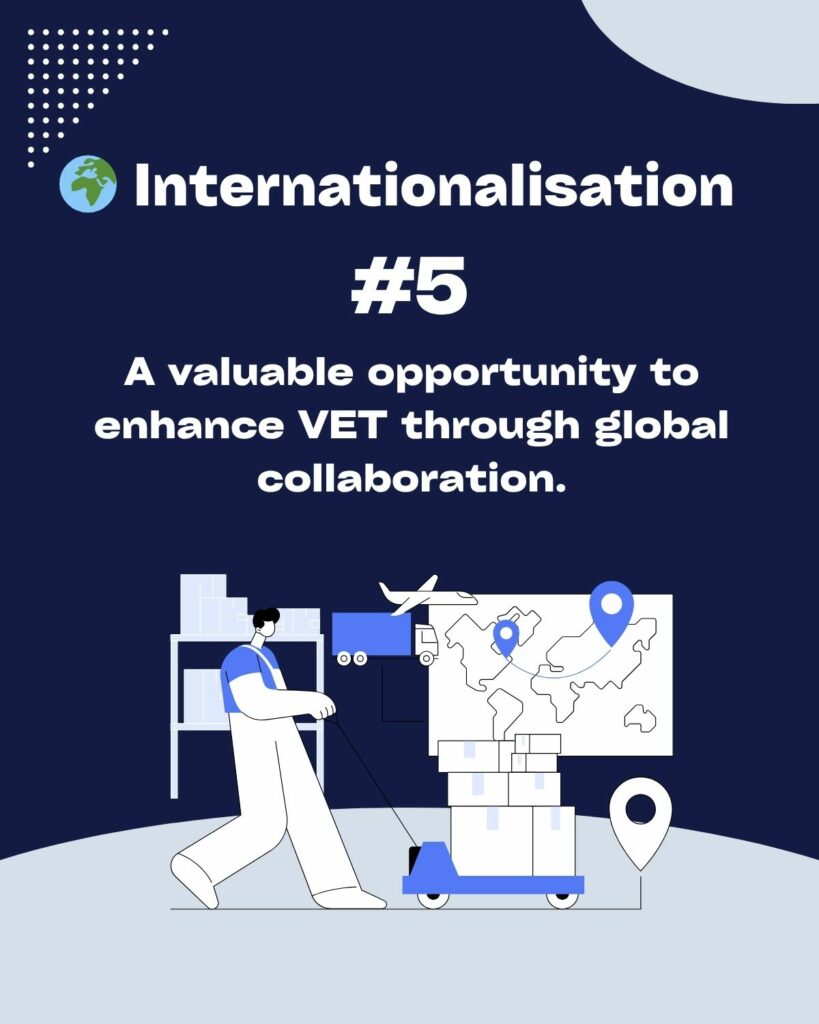
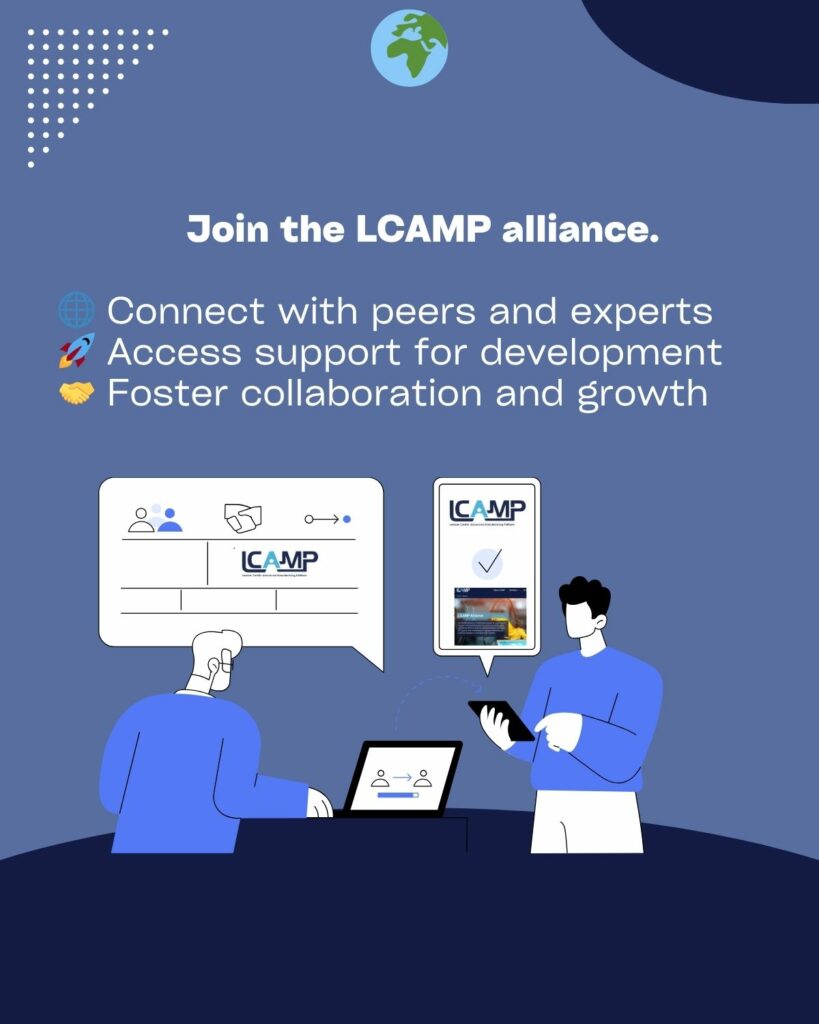
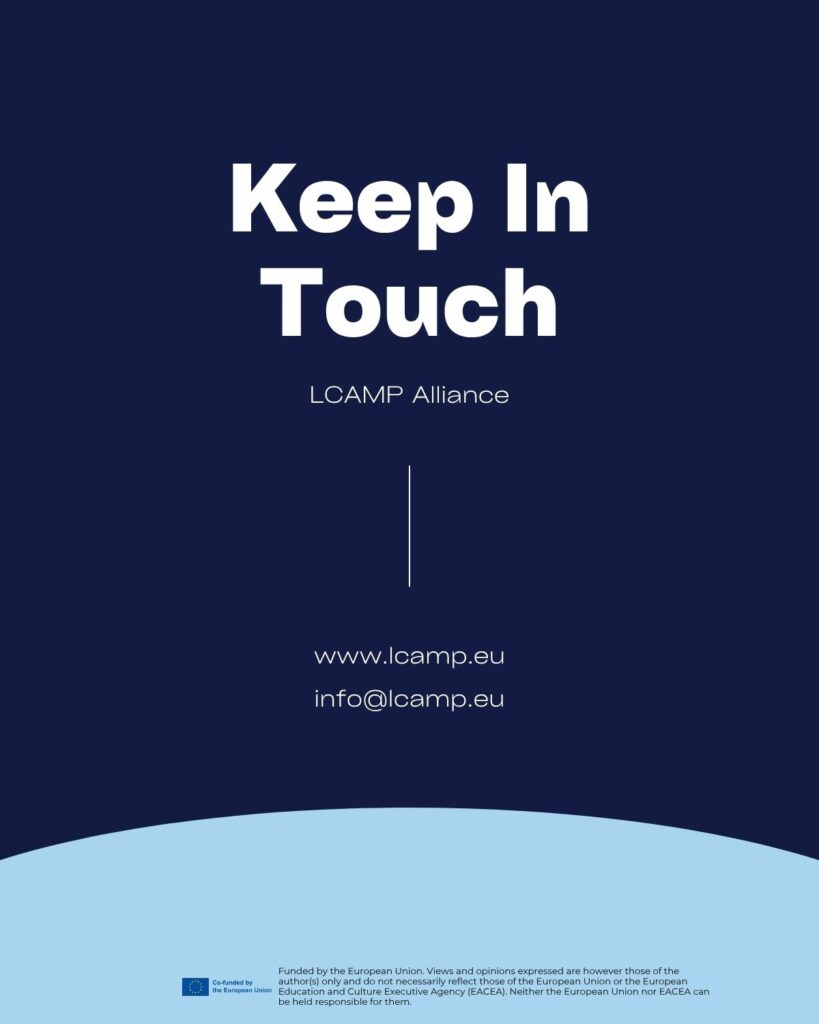
On 24 June 2025, the European Commission hosted the Digital Education Stakeholder Forum in Brussels, marking the 4th anniversary of the Digital Education Action Plan (2021–2027). The forum gathered hundreds of educators, policymakers, researchers, civil society representatives, and innovators to reflect on progress and chart the next steps toward the Digital Education Roadmap 2030.
A Vision for the Future: EVP Roxana Mînzatu’s Keynote
Executive Vice-President Roxana Mînzatu set the tone with a keynote underlining that education and skills are as crucial as defence in today’s geopolitical and technological climate. Her call was clear: investment is needed to ensure every European citizen—not just workers—is equipped for a transforming society.
She stressed the following key points:
- The “Union of Skills” must bring together national and regional efforts for a unified European approach to upskilling.
- By 2030, 90% of jobs will require digital skills, yet 50% of adults in the EU lack even basic digital competence.
- The upcoming European Education Digital Hub and STEM education centres will serve as digital bridges between schools and universities.
- The newly released EU guidelines on AI literacy aim to build critical understanding and responsible use of AI in education.
- “Digital goes circular”: Educators must teach sustainable digital practices in line with circular economy goals.
- The EU is aiming to train 1 million girls in STEM by 2028.
- The Digital Education Roadmap 2030, to be released by year’s end, will enshrine digital skills as a foundational social right.
Forum Programme Highlights
The event featured a rich and participatory programme that combined policy dialogue with practical exchange. High-level panel discussions addressed key topics such as the Union of Skills and its role in building a European Education Area, the growing importance of AI literacy and inclusion, and how to safeguard digital wellbeing for both learners and educators.
Participants also engaged in hands-on workshops focused on implementing AI in classrooms, harnessing EdTech to drive innovation in VET and schools, and integrating circular economy principles into digital education. Throughout the day, attendees enjoyed multiple opportunities for networking and collaboration, all designed to encourage peer learning and exchange among ministries, universities, NGOs, SMEs, and EU institutions.
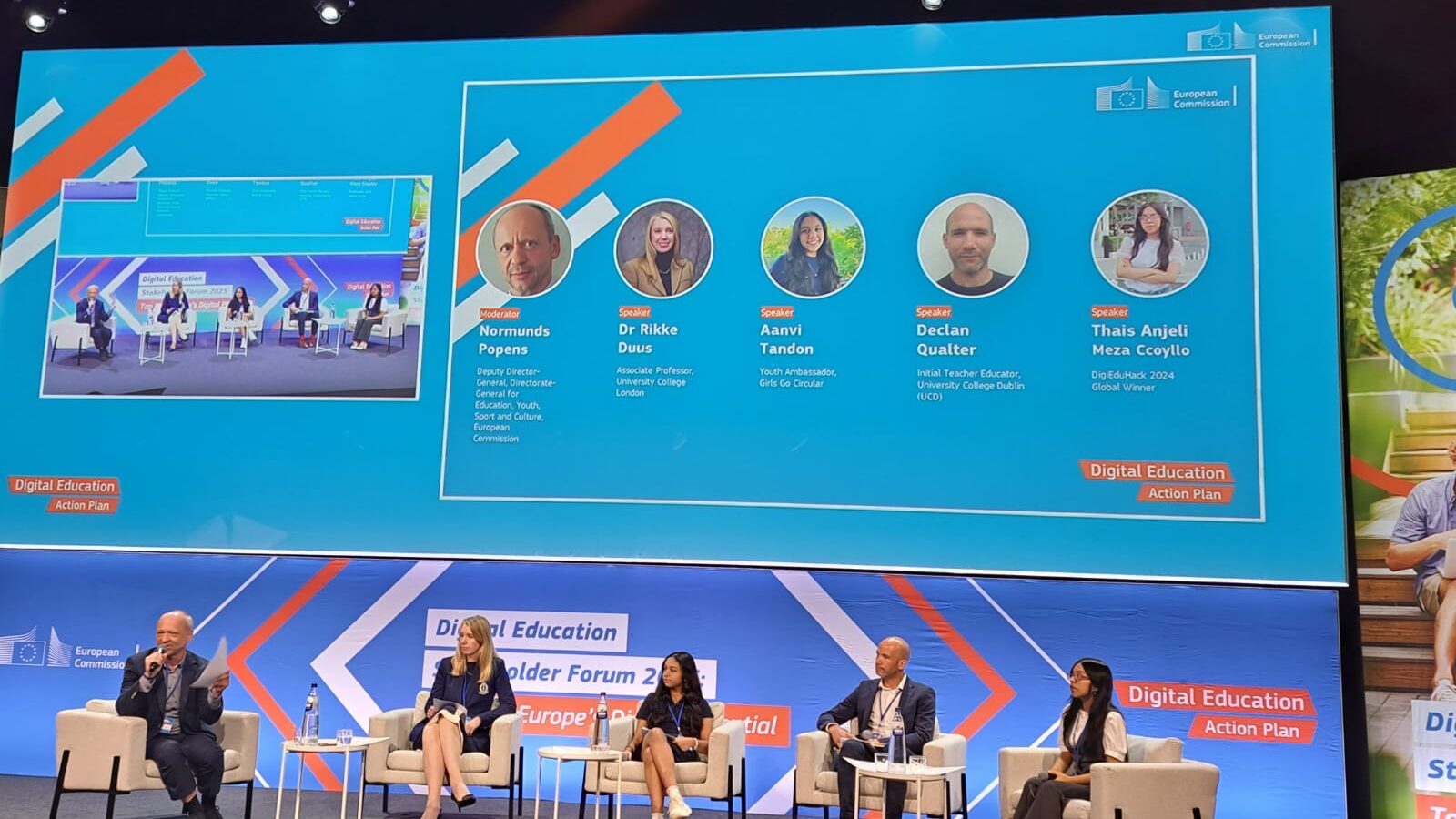
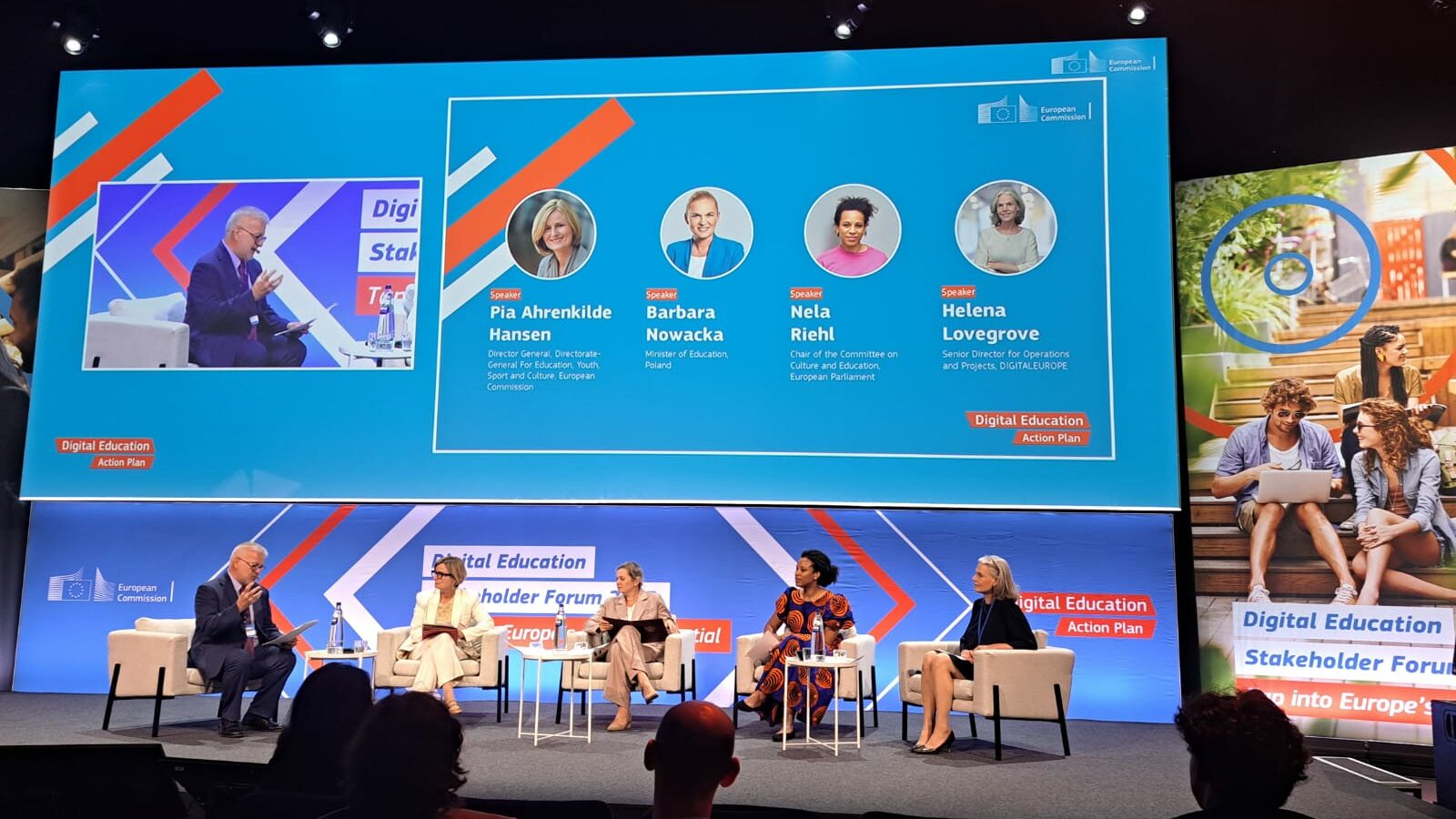
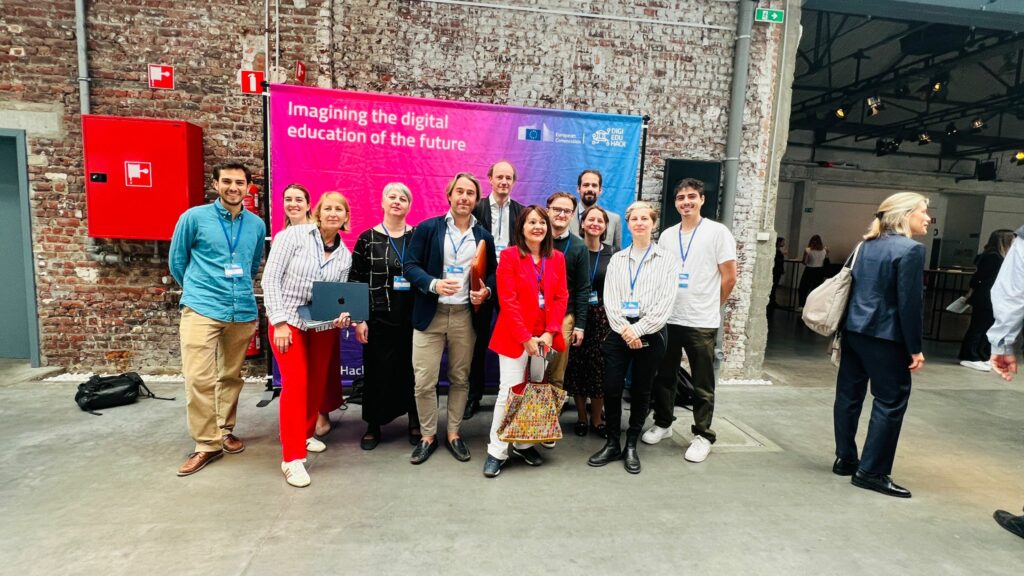
Global Talent Shines: Digital Education Hackathon Winners
One of the most inspiring moments of the day was the announcement of the winners of the Global Digital Education Hackathon. Teams of students from Mexico, Peru, and Italy (University of Trento) were recognized for their innovative solutions in digital learning, inclusiveness, and AI-enhanced pedagogy. Their projects demonstrated the power of youth-driven innovation and the truly global reach of Europe’s digital education efforts.
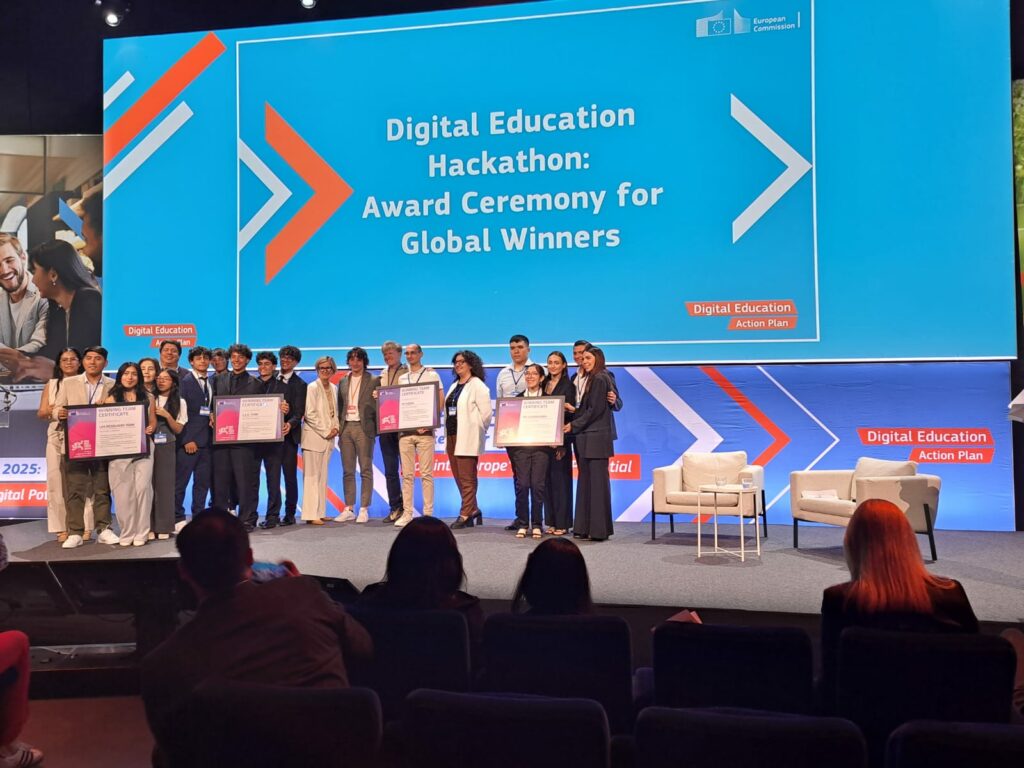
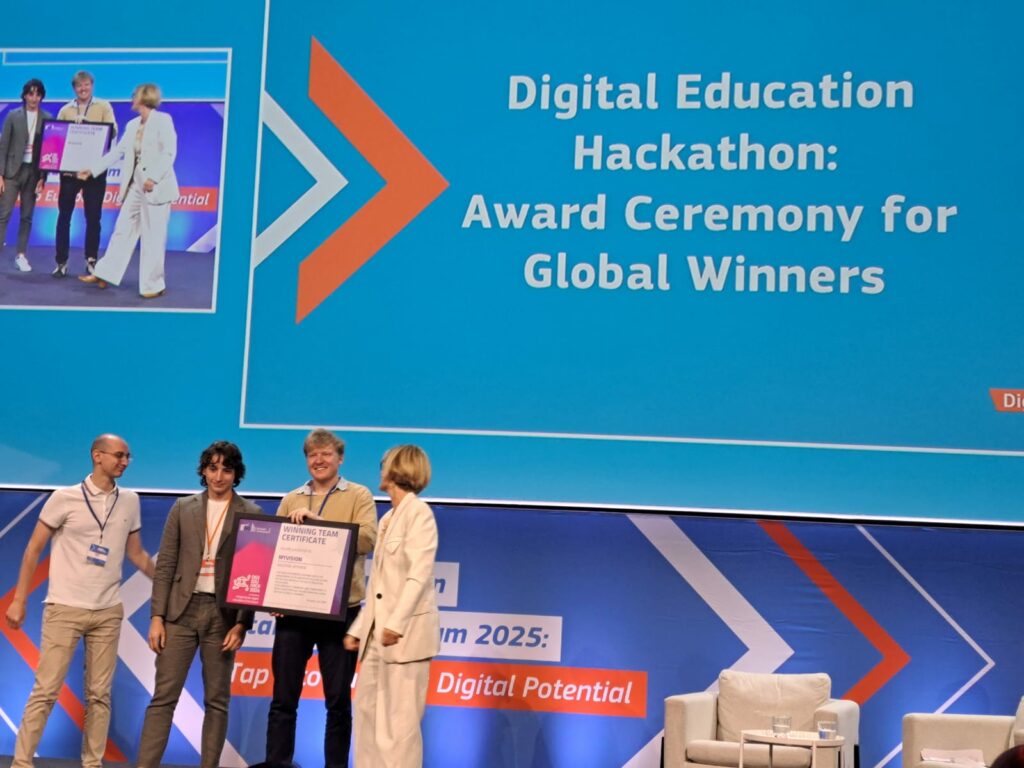
A Forum of Meaningful Connection
Beyond speeches and sessions, the Forum provided vital opportunities for networking and collaboration among stakeholders across sectors. The face-to-face setting allowed for the creation of new partnerships and the strengthening of shared commitments to inclusive, accessible, and future-ready digital education.
As the EU-funded Helhetslyftet (The Complete Competence Boost) project concludes in June 2025, EARLALL is proud to highlight the active and inspiring role played by our member, the Region of Västra Götaland, particularly through the excellent work of Campus Strömstad.
Coordinated by the Folkhögskoleförvaltningen (Folk High School Authority) in Västra Götaland and supported by the Asylum, Migration and Integration Fund (AMIF), Helhetslyftet brought together over 30 partners across 16 municipalities to improve pathways to integration and employment for third-country nationals. Through tailored efforts in language development, vocational preparation, and civic participation, the project has made a lasting impact on both individuals and local systems.
One of the standout contributors has been Campus Strömstad, whose approach to integrated education—combining Swedish as a second language with vocational training—has become a model of innovation and effectiveness. The campus focused not only on improving teaching methods but also on staff training, course development, and enhanced study and career guidance. Their work has shown how combining language and vocational skills can foster stronger, faster, and more inclusive pathways to employment.
Future and Dissemination Final Conference
The project concluded with an inspiring Framtidskonferens (Future and Dissemination Conference) in Gothenburg, where partners from municipalities, folk high schools, and civil society organisations came together to share experiences and look ahead.
The day opened with welcoming remarks from Vincent Catot (European Commission) and Maria Lindqvist (AMIF, Swedish Migration Agency), followed by a project overview presented by Theresé Ydrén, highlighting working methods, collaboration structures, and strategic approaches.
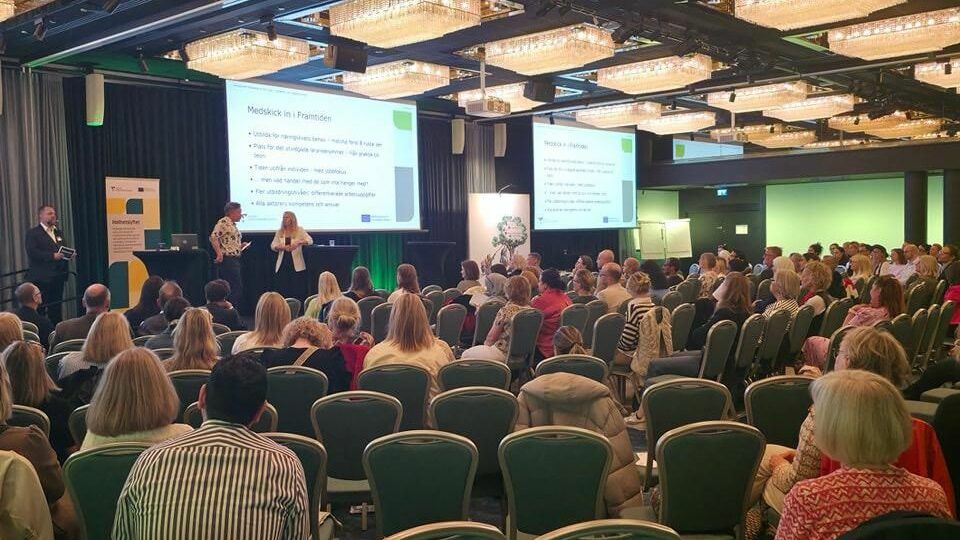
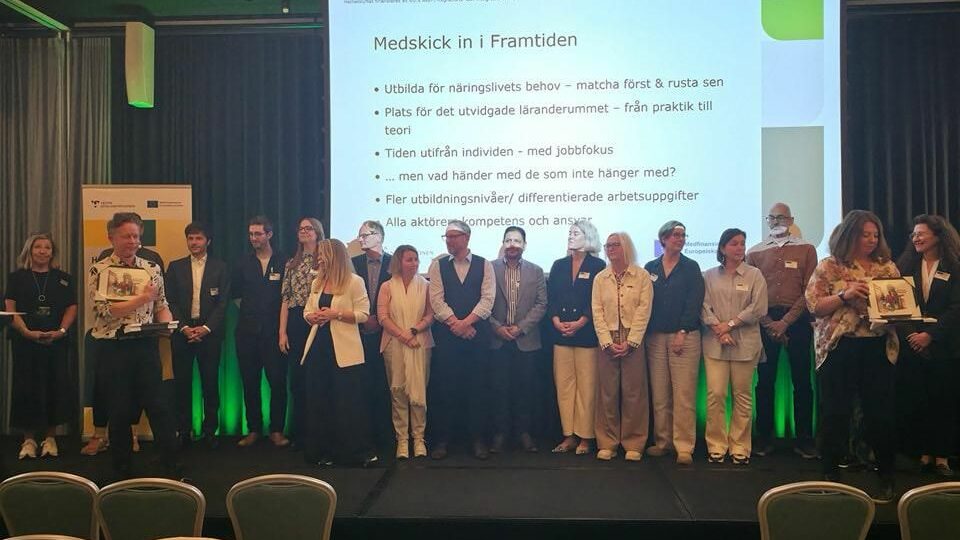
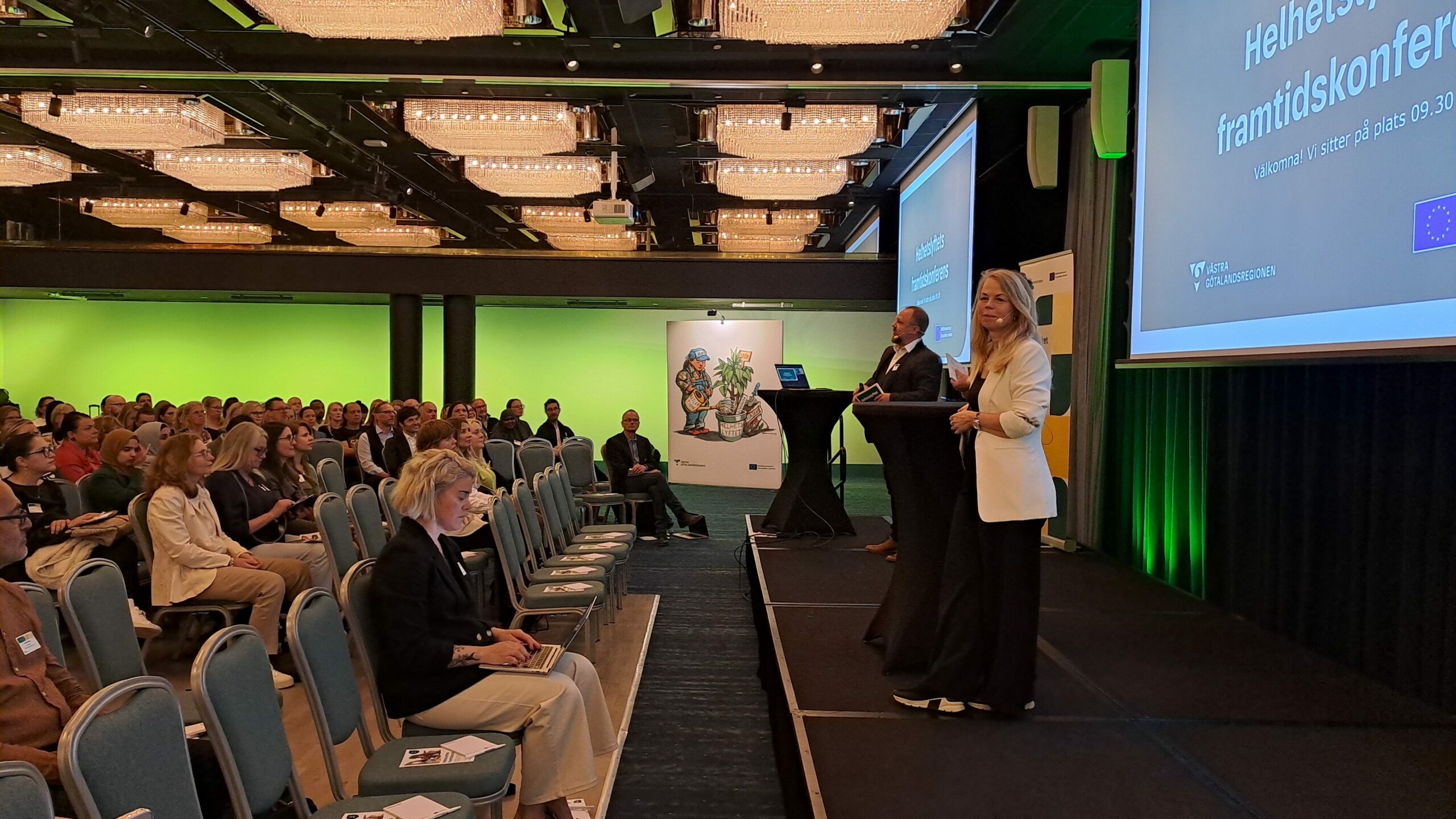
Participants engaged in dynamic panel discussions and presentations, including a contribution from Support Group Network, which shared key lessons learned and insights for the future. A common thread throughout the event was the emphasis on collaboration—a defining element of Helhetslyftet that partners are committed to maintaining moving forward.
A strong focus was placed on the future: how the methods and approaches developed throughout the project will continue to be applied to strengthen cooperation and support third-country nationals’ integration into the labour market and broader society.
Alongside breaks and lunch, attendees explored a mini fair where around ten organisations presented their work—creating a vibrant and educational exchange space.
Among the standout contributors was Campus Strömstad, whose approach to integrated education—combining Swedish as a second language with vocational training—has emerged as a model of innovation and effectiveness. The campus focused on teaching development, staff training, tailored course design, and study and career guidance. Their success shows how blending language and vocational skills can accelerate inclusive, effective routes into employment.
At the conference, Campus Strömstad’s principal, Alexander Johansson, joined a panel to present their “BIP-inspired” approach—drawing from Denmark’s Employability Indicator Project (BIP), developed by Vaeksthusets Research Center. This framework helps educators identify learners’ prior experience, align with individual goals, and foster real-world work connections within Swedish for Immigrants (SFI) education.
“Through The Complete Competence Boost, our staff have learned to work according to BIP, and we are happy to have new tools that really give results,” said Johansson.
“We’ve seen our students take their first steps toward language, studies, internships, and employment—with pride, joy, and a growing sense of participation in society,” added Project Manager Anja Sonerud.
Finally, the project set out with the ambitious goal of reaching 2,400 third-country nationals. As of today, 2,414 participants have already taken part—and that number is still growing. We expect to reach at least 2,500 individuals by the project’s close, a testament to the dedication and collaboration of all partners involved.
“Through The Complete Competence Boost, our staff have learned to work according to BIP, and we are happy to have new tools that really give results,” Johansson noted.
“We have seen our students take their first steps toward language, study, internship, and employment—with pride, joy, and a growing sense of participation in society,” added Project Manager Anja Sonerud.
A strong focus was placed on the future: how the methods and approaches developed throughout the project will continue to be applied to strengthen cooperation and support third-country nationals’ integration into the labour market and broader society.
From 24 to 28 November 2025, Switzerland will organise the third edition of its National Mobility Week, a flagship initiative by Movetia aimed at fostering exchange and mobility across the country’s diverse language regions. This year, the focus is placed on Vocational Education and Training (VET), with new opportunities and events designed to strengthen cooperation and promote cultural and linguistic understanding in vocational pathways.
What is National Mobility Week?
Launched by Movetia, the Swiss agency for exchange and mobility, National Mobility Week is an annual celebration of domestic mobility and intercultural dialogue. The initiative seeks to highlight the importance of exchange in education at all levels and to make mobility experiences more accessible, especially for young people in vocational training.
2025 Highlights: Short-Term Mobility for VET Learners
A new initiative in 2025 introduces 2–5 day workplace exchanges for learners pursuing a Federal VET Diploma. These short-term mobility opportunities enable young people to experience another linguistic region of Switzerland while developing personal, linguistic, and professional skills.
The scheme is financially supported by Movetia and aims to:
- Encourage cross-regional collaboration
- Foster openness and inclusion in vocational training
- Make mobility accessible, even for those with limited time or resources
EARLALL supports regional initiatives like Switzerland’s National Mobility Week that promote intercultural learning, skills development, and cross-border cooperation—all vital to inclusive, future-proof education systems.
Today, EARLALL took part in the Cedefop Brussels Seminar, “Youth in Education, Youth in Employment – Boosting European Policies for Social Inclusion”, held at the Permanent Representation of Poland to the EU. Hosted under the Polish Presidency of the Council of the European Union, the event brought together experts, policymakers, and stakeholders to discuss urgent and coordinated actions to support young people across Europe—especially those not in employment, education or training (NEETs).
The seminar was moderated by Irene Psifidou, Cedefop expert from the VET for Youth Team Facilitator, who set the scene for the day. In her opening remarks, she introduced the event’s core themes and presented the speakers, placing a strong emphasis on the role of inclusive VET systems in addressing youth unemployment and social exclusion.
Setting the Stage for Inclusive Growth
The seminar opened with a warm welcome from Michał Drozdowicz, Chair of the Social Questions Working Party and Head of Social Politics, Employment and Equal Opportunities Section at the Permanent Representation of Poland to the EU. He emphasized the necessity of ensuring that every young person has the opportunity to succeed in the labour market and contribute meaningfully to society, calling for a stronger, more inclusive European social policy framework.
Cedefop Executive Director Jürgen Siebel reflected on 50 years of Cedefop’s work shaping EU skills policy, highlighting the essential role of vocational education and training (VET) as a bridge to both individual growth and societal integration. “Equal access is crucial to meeting the EU’s objectives on youth employment. Together, we share the responsibility to make it happen,” he stated.
Voices from the European Parliament and Beyond
MEP Brigitte van den Berg, a strong advocate for vocational education and training (VET), underlined that VET is not only about skills—it is fundamentally about building confidence and empowering young people, particularly in rural and underserved areas. She stressed the importance of broadening access to micro-credentials, enabling young people to gain recognition for their learning and improve their chances on the labour market.
MEP van den Berg noted that traineeships at the European Parliament were once limited to university graduates, excluding VET alumni. This barrier has now been removed, and she proudly introduced her current trainee, a VET graduate.
Cedefop Insights: Tackling the NEETs Challenge
A core focus of the seminar was the presentation of new insights and tools from Cedefop’s team of experts — Irene Psifidou, Stefanie Ledermaier, Anthie Kyriakopoulou, and Michalis Papazoglou — on empowering NEETs through VET.
With over 8 million young people currently classified as NEETs in the EU, the team presented updated statistics and trends from 2014 to 2024. Although the overall NEET rate has declined, significant disparities persist in terms of gender and geography. Remote and rural youth continue to be disproportionately affected.
The team unveiled Cedefop’s VET toolkit for empowering NEETs, designed to provide targeted support through outreach, mentoring, skills validation, and flexible training pathways. The toolkit also supports teachers working with NEETs, underlining the importance of tailored continuous professional development (CPD), hands-on experience, and psychosocial awareness.
Stefanie Ledermaier presented an integrated intervention model aimed at supporting NEETs — particularly young women — through a comprehensive approach that bridges policy, academic insight, and good practices.
Anthie Kyriakopoulou presented new research into the profiles and needs of VET teachers working with NEETs, identifying a strong need for targeted training and deeper understanding of NEET learners’ unique challenges.
Cedefop underlined that direct experience with NEETs makes educators significantly better prepared, and that targeted CPD focused on NEETs’ specific needs is essential. The presentation also stressed the importance of extended support, including psychosocial and language mediation, and showed that hands-on engagement delivers the greatest impact.
Inspiring Practices and Innovative Solutions
The event featured a showcase of promising practices from across Europe. Juan-Anton Gambina, Principal Executive for Jobseeker Services at Jobsplus, the Public Employment Service of Malta detailed the national employment service’s youth-specific mentoring, training, and projects “atWorkNEETs” , Youth Guarantee 3.0. and ALMA.
Kati Marin, an Expert in lifelong learning at Metropolia University of Applied Sciences, introduced a framework for using modular micro-credentials to create learner- and labour market-oriented pathways, tailored to diverse skill levels and life contexts.
Oscar Pasquali, CEO of Generation Italy, presented a unique seven-step methodology that consistently delivers high employment and income outcomes for programme participants, regardless of their prior experience, professional background, or country of origin. This model is the result of years of research and practice in engaging young people who are excluded from the labour market and education systems. Generation’s global reach: 174,100 learners have taken part in training programmes; 112,880 job placements have been recorded; activities span 384 cities; the model operates in over 17 countries and six industry sectors.
Panel Discussion: Unlocking the Future of Youth Employment
A closing high-level panel moderated by Cedefop’s Irene Psifidou brought together representatives from the European Commission, European Association for the Education of Adults (EAEA), Educational Research Institute – National Research Institute, Polish Ministry of Education, German Employers’ Confederation, and Wallonia’s Public Employment Service.
Koen Bois D’Enghien (European Commission, DG EMPL) emphasized the role of VET and the forthcoming VET strategy, alongside targeted support for teachers. Raffaela Kihrer (EAEA) called for policy coherence and a learner-centric approach across sectors.
Karolina Malinowska (Polish Ministry of Education) shared Poland’s journey from a 22% NEET rate to 9%, now turning their focus to migrants and inclusive non-formal learning. Sabina Casini (German Employers’ Confederation) underscored the importance of peer-to-peer engagement, simplified recruitment, and social partnerships. Yves Magnan (Le Forem, Wallonia) highlighted the critical role of mental health support, early intervention, and integrated services in keeping youth connected to training and employment opportunities.
The seminar served as a powerful reminder of the shared European responsibility to support young people’s transition from education to meaningful employment. Through cooperation, innovation, and inclusive policies, stakeholders across Europe—governments, institutions, educators, and employers—can collectively ensure that no young person is left behind.
EARLALL remains committed to supporting these efforts, advocating for lifelong learning systems that are inclusive, flexible, and aligned with the needs of all young Europeans.

